#dunmeshi analysis
Text
How about an analysis of Dunmeshi's latest episode?
What I find really interesting, and episode 17 made me realize it, is the extent to which Laios and Shuro are the opposite of what they portray, even worse: the image they might portray is actually that of the other.
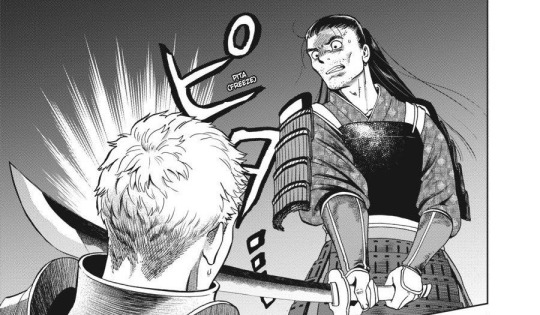
Let me explain :
How does Shuro see Laios ? As someone stubborn and thoughtless, disconnected from reality to the point of using black magic to resurrect his little sister.
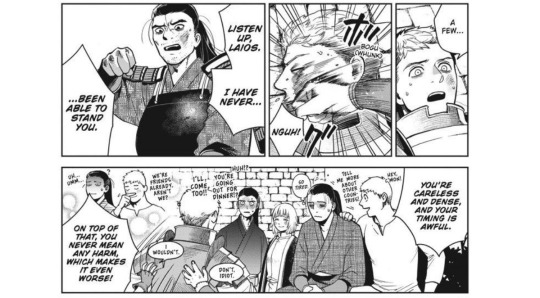
We know that Shuro would have made the same choice, which shows that even if he tries to deny it, there is a point of connection between them.

The key to these similarities and differences is Falin.

What Shuro loves about Falin is the tenderness in her every gesture, her compassion and understanding of every creature, and her smile.
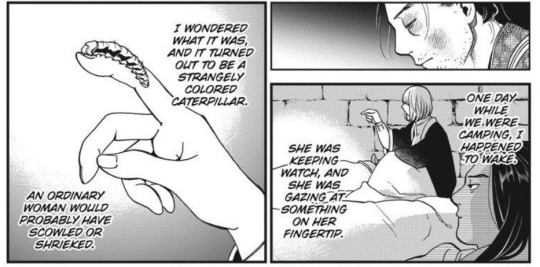
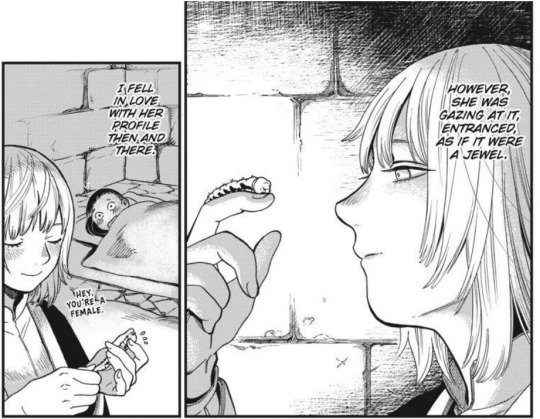
When he sees this monster kill in cold blood, he realizes the extent to which he has lost his loved one, which is why he chooses to kill her to free his soul, thinking he has lost her.
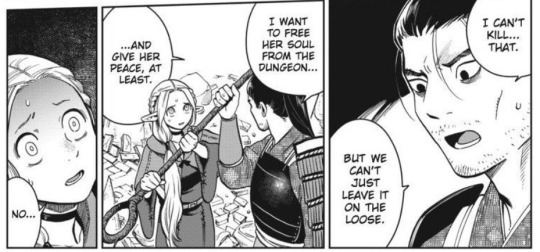
But what Shuro doesn't realize is that he's exactly what he's blaming Laios for: he's stubborn and reckless, not realizing the danger and sacrifices his teammates are making for the sake of this mission.
He's also disconnected from reality, not caring about himself, his hunger or his fatigue.
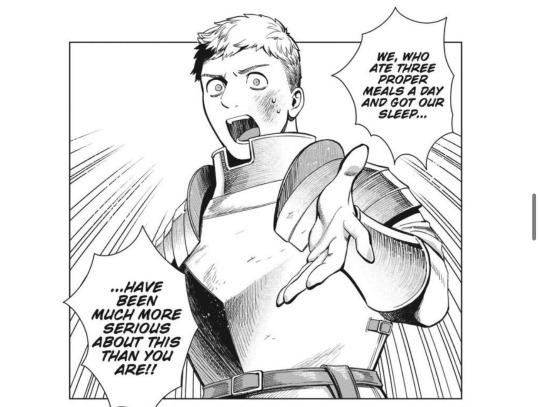
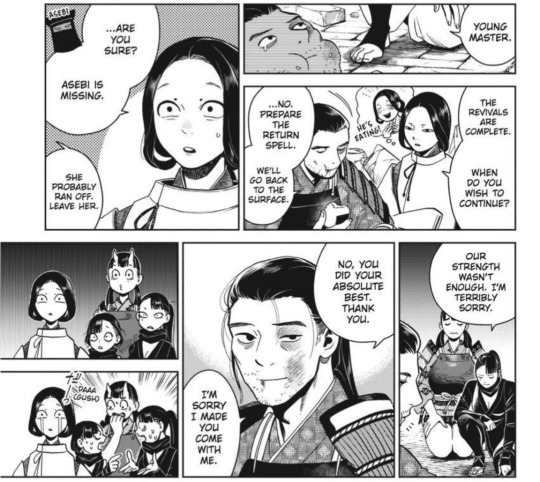
Above all, and this is very interesting, Laios had said that he hadn't perceived that Shuro couldn't stand him because he was so happy to have him as a friend, that he hadn't detected any of these signals.
Shuro shares this blindness

Shuro repeats that this monster is not Falin, yet he sees her as such, to the point of embarrassment when the monster removes her blouse.
And that's the opposite of Laios, who sees his sister as the monster she is
Like the chimera Falin has become, he sees his little sister calling him and this super-cool monster.
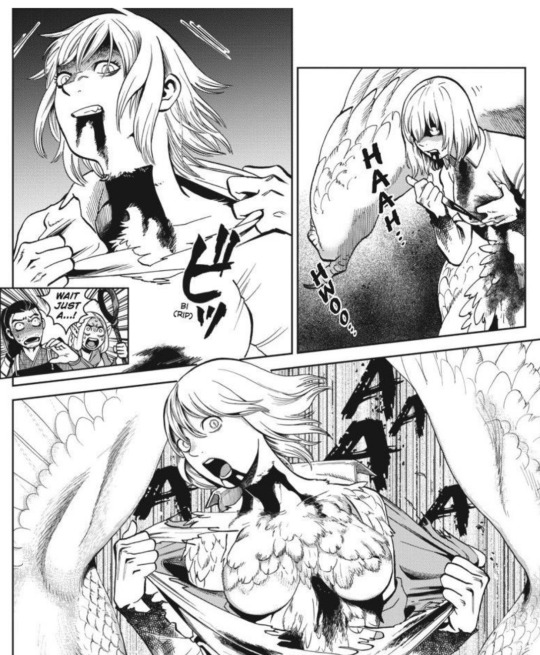
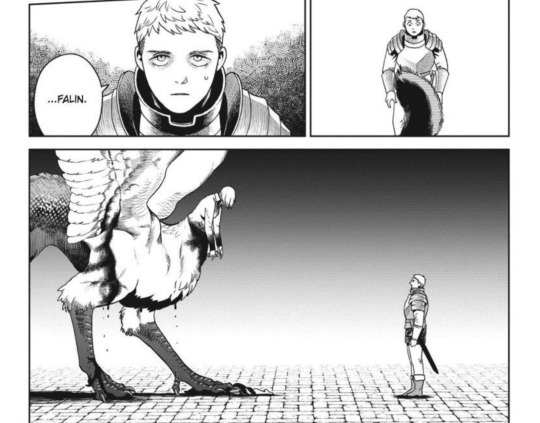
He's the one with his feet firmly on the ground, he's the one who really cares about his team, taking care of himself and those around him through balanced meals.
The one who understands that Falin has many vital points, rather than allowing himself to be overwhelmed by despair, is Laios.

So when Shuro hits Laios, in reality he's not hitting a man who differs from him, he's hitting his own flaws, and his own failure in the situation.
This failure he projects onto Laios, a man brimming with flaws.
Not only does Laios reason with him, but if Shuro ends up taking the wiser path, it's also because he's literally fought against himself.
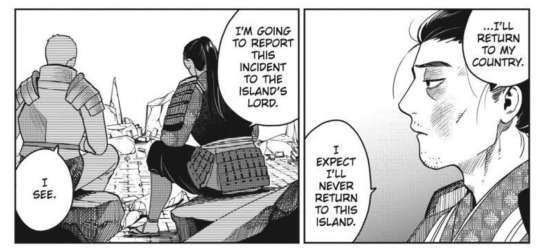
But it all goes even further!
Shuro realized his feelings, or rather how unique Falin was in her tenderness and altruism, towards every being, even the smallest.
But what set this whole cycle in motion was Falin's self-sacrifice, her own death.
Laios and Marcille are responsible for what follows, but they are not responsible for everything, as Shuro tries to believe.

Shuro refuses the truth
So he doesn't see Falin
He couldn't accept that her tenderness had led to his death
Nor that her tenderness gave way to extreme coldness and indifference
He won't accept his own blindness
So he hits Laios and his extreme sincerity that irritates him so much

Shuro can't see anything in the darkness of this dungeon, he's the one who's lost his footing so he has to get back up again
Laios has accepted to see everything, even the unavowable, the forbidden, the pain.
What Shuro sees in Falin is love
In Laios, what he sees is the truth
In reality, Laios has only told part of the truth; he is the other half.

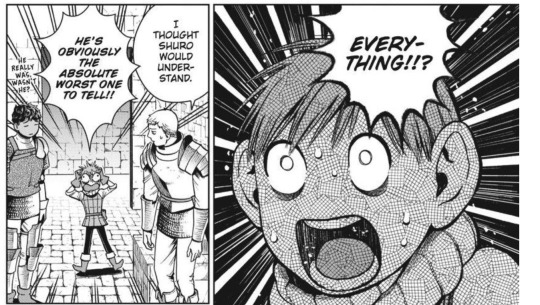
But if he goes back up, it's not to abandon Falin, Shuro has to face reality, the truth, that Laios was the only one who could save his beloved.
It was by fighting that he finally put his trust in Laios.
And finally became a friend
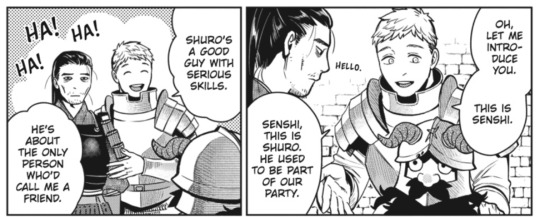
#dunmeshi anime#dunmeshi#dungeon meshi#delicous in dungeon#dunmeshi ep 17#dungeon meshi 17#episode 17#shuro#laios dungeon meshi#falin dungeon meshi#marcille donato#falin touden#laios touden#chilchuck#analysis#dunmeshi analysis#dungeon meshi chapter 35#dungeon meshi chapter 36#dungeon meshi chapter 37
346 notes
·
View notes
Text

I've seen pieces from this extra comic before, but never read the full thing until today. And holy shit does it hammer home just how much the story is about class.
Multiple times, when food comes up in this comic, it’s also in context of money:
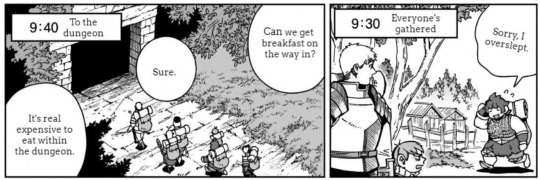
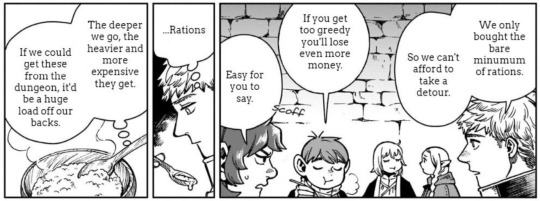
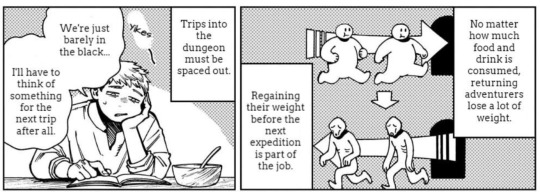
I've seen this last panel on the right brought up before in context of like, dungeon meshi's relationship with fat and eating, but in the full context of the comic it really hits how much adventuring directly consumes bodies for money.
As much as this has been part of the story the whole time, showcased as early chapters 19 and 20...
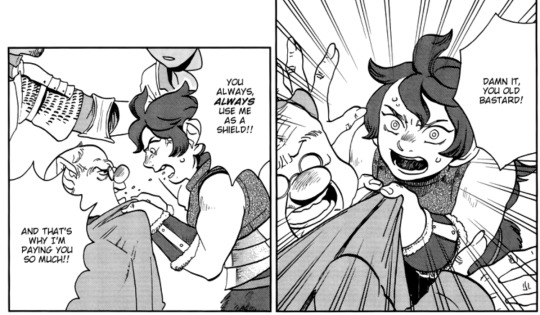
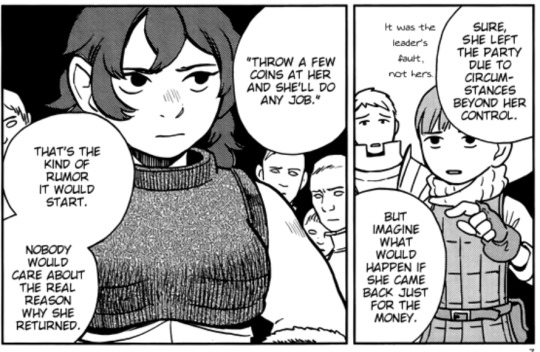
It never fully hit me before how often adventuring comes down to having no other way to make money but to throw yourself into death repeatedly. To be used, whether it’s by individual selfish people (like the resurrection group that is happy to try and get Kabru's group to kill each other to get extra gold from them in chapter 32), or by the greater cog of the Dungeon Economy in general.
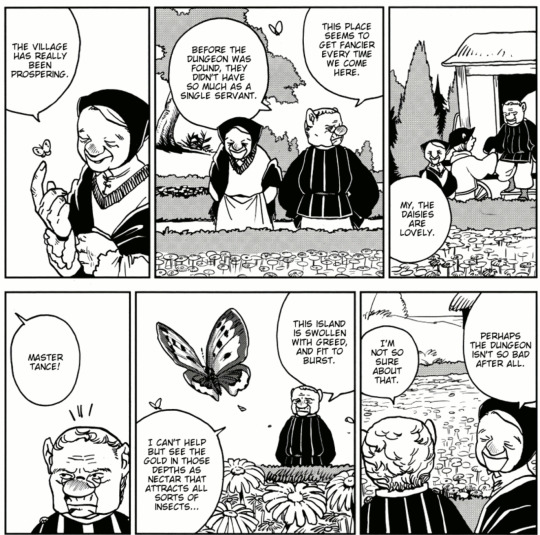
Which, to be clear, is all too often how things work in the real world, too. So many jobs burn through the health and lives of workers. Dungeon Meshi just makes it literal in a new way: by making the healing and resurrection, a core part to the adventuring loop, directly use fat, muscle, and energy from the body being healed.
Imagine Amazon, but if you got injured at work, they could literally burn up some of your body to get you back to working sooner. And that was seen as an advantage of the job.
And then you have Laios, thinking about eating monsters:
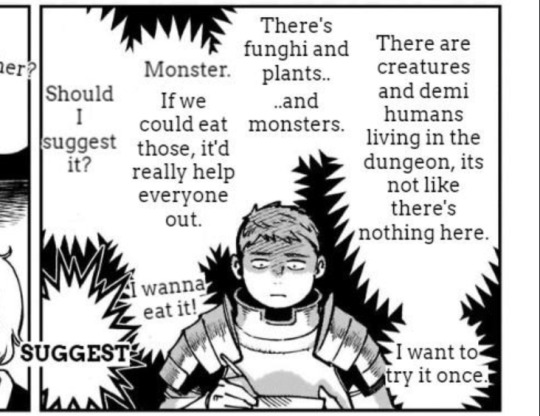
Not just because he likes monsters a lot. But because it would help. He says something similar in the actual manga too, during the chapter discussing his dream with the Winged Lion
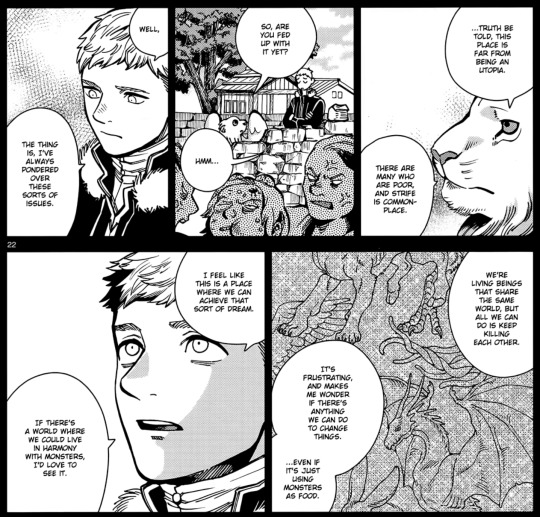
Laios wants to be able to make a home for Falin. He wants to give her a place where she never has to eat alone. And when he gets a party, he wants to give them a way to eat well. And when he runs a country, well…
He wants to ensure that everyone has enough to eat.
Food is political. Food ties into class, and money. What is deemed "proper" to eat, what is a luxury, what is crass… so much of it comes down to money.
Being judged for eating what's available, when what is “proper” isn't affordable, is already a thing that happens. People forced into work that consumes their energy is already a thing that happens.
Dungeon Meshi has a lot of fantastical elements, but boy is its examination of food and class very real.
#dungeon meshi#delicious in dungeon#laios touden#dungeon meshi spoilers#the full thing is up on mangadex and I v much recommend giving it a read#dunmeshi analysis
15K notes
·
View notes
Text
The more I think about it, the more Laios and Falin's different perceptions of their parents are a case of "same parents, different childhood".
Whenever someone asks Laios about his and Falin's family, he comments on how they treated Falin but never comments about how how their childhood affected him - in fact, he kind of glosses over it. It's Falin that everyone is rallying to save, it's Falin that's Marcille's friend, it's Falin that everyone has a positive opinion of - he's just the weirdo brother that gets to share some of her light sometimes. He's the one who's only tolerated when he's useful in a dungeon. Falin's treatment is a large part of the reason that he left, but it's the symptom of a larger issue.
When we see Laios' thoughts of his parents in his nightmares, it's all about the expectations that he's supposed to live up to: the expectation to stop being "childish", the expectation to get married (to who his parents picked) and have children, the expectation to take over from his father as the village chief, the expectation to adapt to something that he isn't able to be in the way that people want him to. And these are all things that he has had to be told in some way: he had to be told that Shuro didn't like him, he had to be told that told that the gold-peelers were taking advantage of him - these aren't thoughts that just appeared on their own, these are all failures that someone has explicitly pointed out to him and they haunt him. Some of the things he considers his biggest failures are his failure to provide for and protect Falin and those have very tangible examples he can point to.
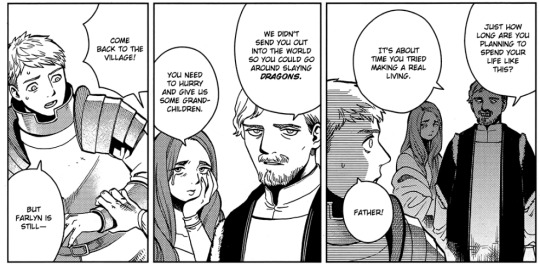
We get a glimpse of what happens when he fails to live up to his father's expectations when Falin is born. He expects a certain reaction from Laios and when he fails to give that reaction he physically puts him down, dismisses him, and underestimates how much he understands.
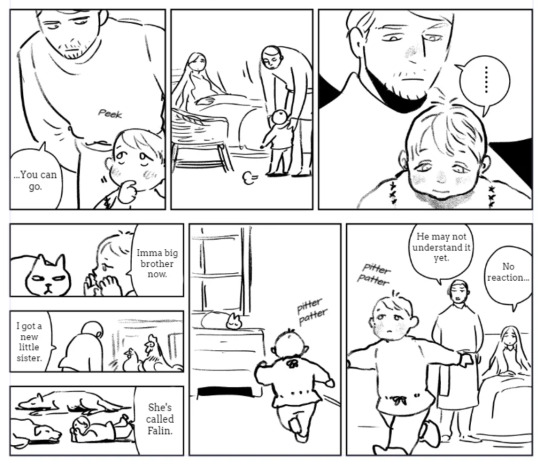
And that's something that's shown to be a bit of a sore point for him - people thinking that he doesn't understand something because he doesn't express himself like people expect. The few times we see him snap at people are because people think he isn't understanding something because he isn't reacting "normally".
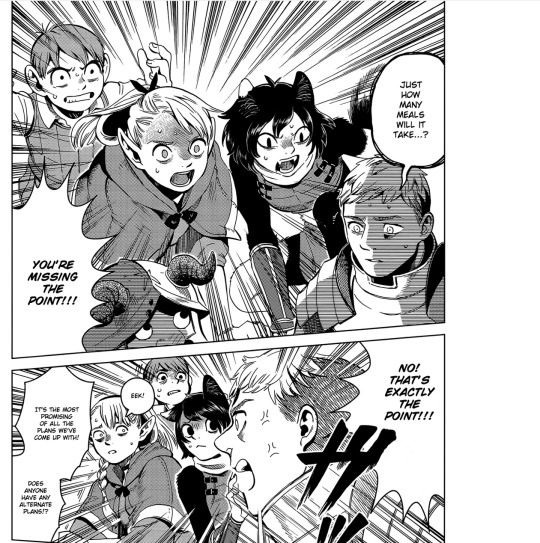
On Falin's side, the expectations seem to be a lot different - she's the younger one, for one, she's a girl, and she was so young when the fallout from her having magic happened. She too had an arranged engagement, but that was broken off when she was sent away to magic school and since then, their parents only seem to be passively involved in her life. She's mostly been freed of the expectations that their parents had for her in her village - she won't be coming back after all. She understands why they sent her away, she wasn't completely oblivious to the villagers treatment of her and it was, arguably, for the best so she is at peace with what their relationship is for now. But she still wants to go to her hometown and see for herself with adult eyes because she has never really had the space to do that.
I don't think their parents are inherently evil people - the truth is probably somewhere between Laios and Falin's version of the story, Laios' side tinged by too much cynicism and Falin's by too much naivete.
It just strikes me that when he tried to provide the "normal" way he failed, but given the space to do something similar to what people expected of him, but in his own way, he succeeded. He isn't perfect but his efforts are ultimately fruitful and he is able to carve out a place for himself, Falin, and others who had been ostracized like them to call home.
#dungeon meshi#dungeon meshi spoilers#dunmeshi analysis#laios touden#falin touden#i have a lot of touden feelings#i'm not letting mama and papa touden off the hook that easy#dunmeshi spoilers
6K notes
·
View notes
Text
seeing this part is what actually convinced me that ryoko kui knew about autism and wrote the siblings like that on purpose

i struggled finding way to explain why until now
as you can see ever since he was a kid Laios was especially sensitive to other people's expectations, which stresses him out. but Falin herself didn't seem to notice.
yet as adults we see that they grow up to be seemingly opposite of who they were as kids. as per his relationship with Shuro we could see that Laios didn't notice Shuro's distaste against him at all until he was told and with Falin she pays special attention to people and takes care of them to the point that becomes her most memorable trait to her teammates.
honestly it's the kind of progression that i've seen a lot among autistic adults. for laios i usually see it among people who finally found a comfortable space to be themselves and be immersed in their special interest. the happiness can get you kinda tunnel-visioned.
while with falin i feel like she's similar to me where we realized that the things other people usually notice easily doesn't come naturally at us so we end up compensating by working hard at being considerate to our friends but ends up being able to notice little tells others don't usually see
sometimes it's not even two different people, sometimes it's the same autistic person going through all of that
7K notes
·
View notes
Text
Soooo I read all of Dungeon Meshi in this past week and I have many thoughts bouncing around in my brain and I think the only thing to do with them is some AGGRESSIVELY CLOSE READING of a scene I wanted to come back to and try to understand better.
So: I want to talk about chapter 28
This entire section of the story is something I feel like I am going to want to come back to a lot, because its such a transitional time and I feel like there are a lot of themes/ideas that I wasn't fully aware of during my first reading, and stuff I missed because of that.
One of the biggest things I have been turning over in my head is... hey, what was UP with the Marcille/Falin bath scene? Maybe it was because I was already primed to pay attention to stuff with them going into the story, or because I had already seen a couple of panels out of context. In any case, it really kind of stuck out to me as being very short but also VERY intense, while also being... hard for me to define? Some part of the nature of the intensity felt like it was going over my head.
I wasn't sure that revisiting it would help with this right away, but to my surprise, it actually WAS a lot easier for me to follow and understand when I went back to it. So I want to just do a close reading of That Scene and some other parts of the chapter & context around it all, because I think it offers insight into Falin & her relationships, and what purpose this chapter serves within the story as a whole.
So first of all, I think it's interesting that the scene starts with Marcille bathing Falin.
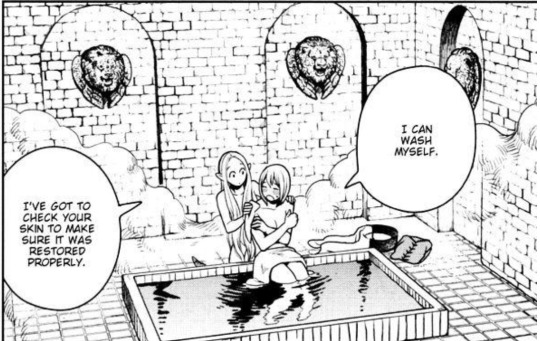
It feels very caring in a more platonic, less charged way then what will follow.
Marcille goes from this caretaker mode to joining Falin in the bath, and then of course we get the first of The Panels
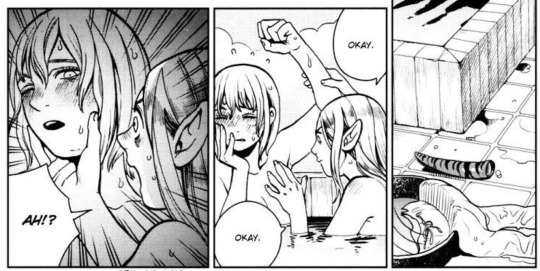
(as a small note, I only noticed when revisiting that Marcille is using the rest of her Kelpie soap in the bath. Isn't that just the most heartwrenching little detail. Augh)
Anyway, one of the first things I thought was interesting going back to this is how much it reminded me of the very different sort of intimacy that came just before it - when Laios and Marcille assembled Falin's bones.
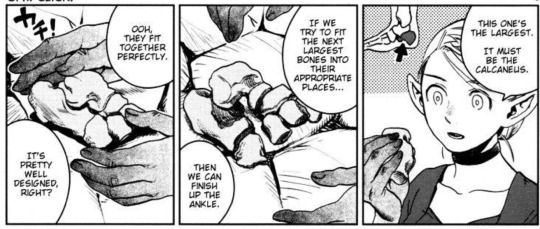
This is such a beautiful and intimate sequence, and something about Marcille examining Falin, whole, after the fact... I can't imagine there are not some echoes of those bones in Marcille's mind. The action seems more startling/intense for Falin at first, and maybe part of that is because Marcille has already experienced this level of intimacy with Falin's body in a way Falin herself wasn't a part of.
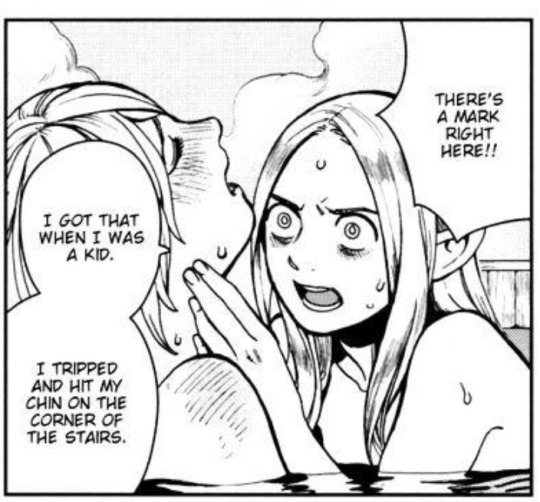
This panel in particular I think is a summation of the difference in the experience for them. This looks like... near orgasmic for Falin tbh, and Marcille is very focused on the actual like practical part of what she's doing, seemingly completely unaware of the Effect she is having on Falin.
The whole short sequence is focused on this intimacy that Marcille initiated seemingly without fully being aware of what she was actually doing. And once Marcille is satisfied, she is also the one that ends it, sitting back in the bath and moving out of Falin's proximity. All on her own terms, and for her own ends.
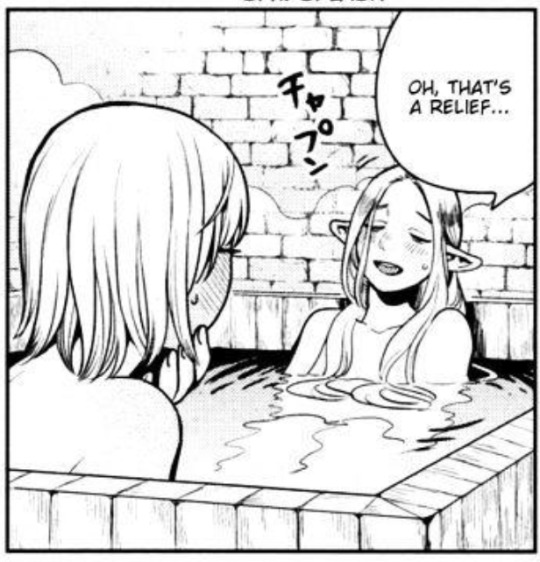
HOWEVER... Falin doesn't just let things go.
Instead, she returns Marcille's attention. First, by asking after her wellbeing:
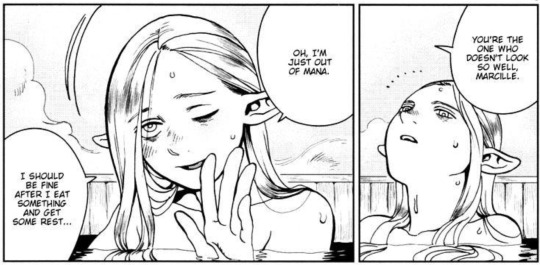
Marcille, of course, deflects (there will be a lot of that in this scene).
But Falin doesn't let it go.
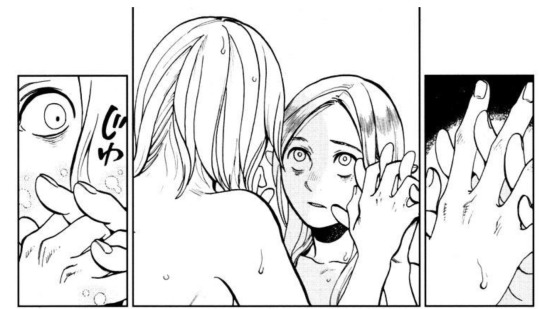
Falin is not a confrontational person. She likes to keep the peace. In this context, and in context of the way that Marcille was the one to come into Falin's space initially, the way that Marcille controlled the initial intimacy... this is striking. I genuinely think that these three panels might convey one of the most assertive actions Falin (as herself) takes in the entire story. One of the only things that outdoes it is the fucking INCITING INCIDENT OF THE WHOLE STORY.
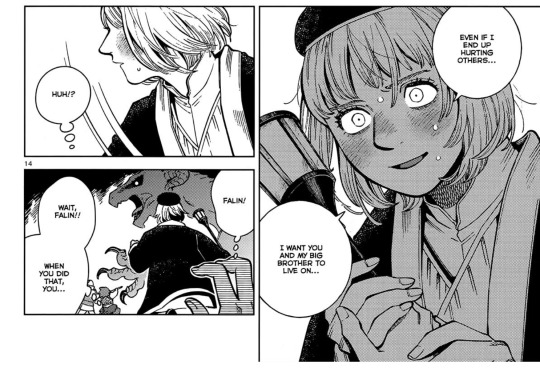
I'd also like to point out here that this action of Falin's also parallels her resurrection by Marcille & Laios. It's is also a forbidden magical action done to save someone(s) she loves, and its something she does TO them, that they are not fully aware/able to react to until its done.
Anyway, back to the bath scene. Falin is taking action here and asserting herself. And how does Marcille react?
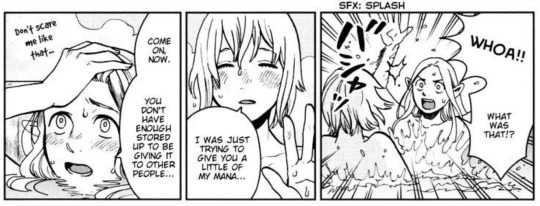
She flips out!! She rejects it! She tells Falin that she isn't supposed to be acting like that.
It's a very distancing response from Marcille, and also one that puts her back in that caretaker mode from the start of the scene. She also puts even more distance between herself and Falin by sinking into the water.
Falin doesn't give up though! She continues to assert herself. She's okay, she is allowed to chose to do this.
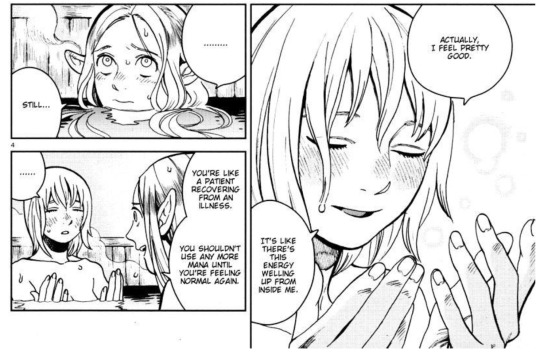
And Marcille continues to push her away. It looks to me like she only starts to relax a little once she fits Falin into a role she can better define and control. You're a patient, you're recovering, I understand this fact and you don't. Let me take care of you.
But, for a third time, Falin pushes back.

I don't think it’s coincidence that this is where she opens her eyes. She asks directly about the thing that they have both been dancing around:

The resurrection spell. The fact that Falin KNOWS about this, at least in part, recontextualizes the quiet battle for control between the two them. They both know at least some part of the truth. Marcille wants nothing else then to ignore it. Falin wants to be able to talk about it. Marcille's blatant refusal to give her those answers, I think, is what keeps them out of sync - intimate only ever in one direction at a time, never fully together.
And of course, even when directly confronted, Marcille refuses to engage with the truth.
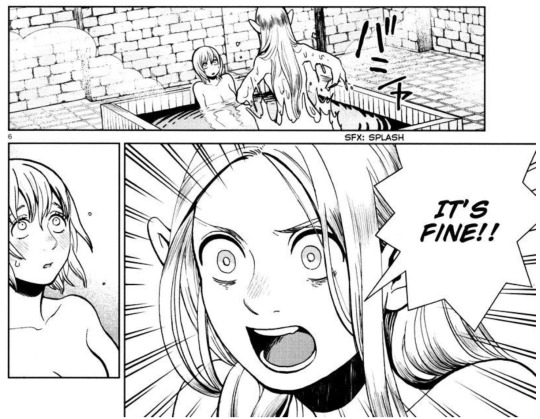
This moment being on the bottom of the page is notable too. There's a beat here. The last panel holds on Falin's face. The reader reaches the bottom of the page, and they are held here for a beat as well, with Falin. It's not quite a rejection yet. What Marcille says isn't directly an answer to Falin's question, but it is a response. A valid one, even! Falin wasn't just asking the question after all, but struggling with guilt that Marcille has every reason to want to reject.
But then you move on the next page, and...
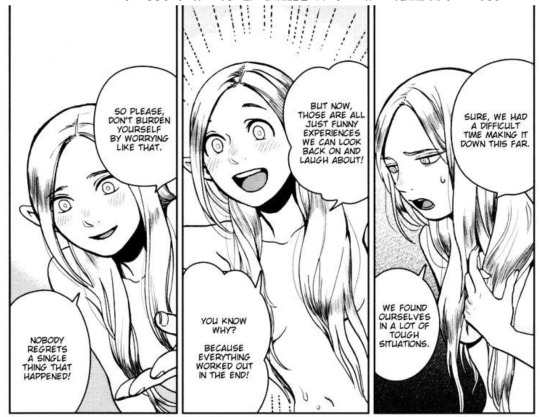
Marcille isn't actually addressing the question at all, not directly. She's deflecting, again. Oh we had a ~difficult time~, there were a lot of "tough situations." Even though she and Falin both know about the resurrection, and Falin has made it clear that she wants to talk about it, Marcille pushes away from the actual topic. She keeps things broad and indirect.
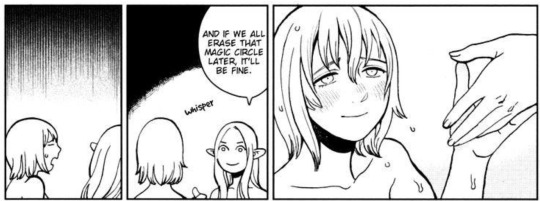
She offers the smallest gesture to Falin - nothing more than a whisper of 'don't worry about it I won't get in trouble' (even though Falin's concern was never just about Marcille getting in trouble).
Marcille then continues to deflect even further, completely changing the subject onto clothes and frog adventures, which seems to distract Falin as well, as she finally gives up on pushing.

And that's where the scene ends! Marcille pushes into Falin's space (without fully realizing), and Falin pushes back. She tries three times to get Marcille to acknowledge her wants, and three times Marcille rejects her, though she does eventually convey some truth. She is honest in her belief that Falin doesn't need to feel guilty, and that things will all work out, even as she continues to deflect the rest of the question. Falin finally accepts that, the topic of conversation changes, and we move on.
But there is a little bit more that happens between them. Towards the end of the chapter, they have this little 'oh no we have to share a bed' situation. Classic stuff.
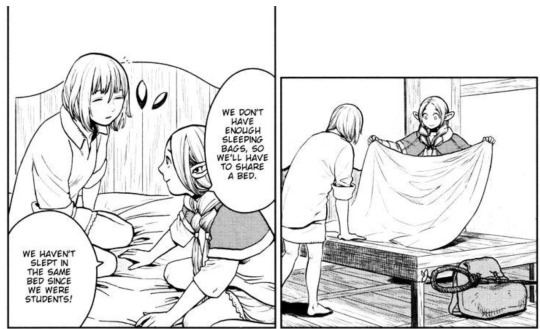
And Falin seems to realize that the context of this is kinda different now then it was when they were in the magic academy. She's not a kid any more, and they just had those intimate moments in the bath. There's a new tension between them, or one that new at least to the bed sharing of it all.

And in this respect, too Marcille pulls away from what Falin is trying to say. She tries to frame Falin as a kid, tries to insist that nothing is different.
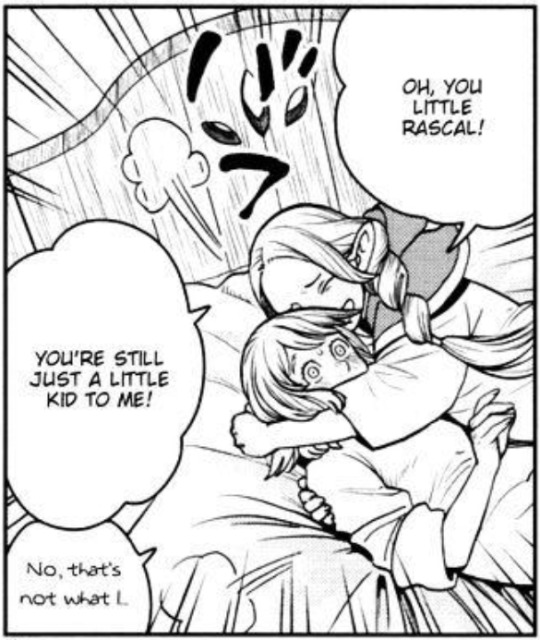
When I first got to this part, it honestly felt... a little uncomfortable? After the bath scene, it is really weird to move into a new intimate situation with Marcille explicitly treating Falin as a kid.
What I have realized in coming back to this scene, though, is how much I think its meant to feel uncomfortable. Throughout the chapter, Marcille's responses to Falin become increasingly patronizing. By letting some of that conflict between them resolve at the end of the first scene, the chapter seems to let things rest, and lets you set it out of your mind.
Then, when the same type of conflict comes back at the end of the chapter, Marcille is even more blatantly treating Falin like a kid, and the unfairness of it hits even stronger. They are both adults, and Falin deserves the truth. After 27 chapters from the perspective of Laios, Marcille, and the others in the group, this progression lets you feel things from Falin's perspective. It's supposed to feel uncomfortable because it IS uncomfortable for Falin, the way no one will quite tell her the truth.
After all, Marcille isn't the only one to do this kind of deflecting when Falin tries to ask about what happened. Laios has a similar response, right down to the 'treating her a bit like a kid' part.
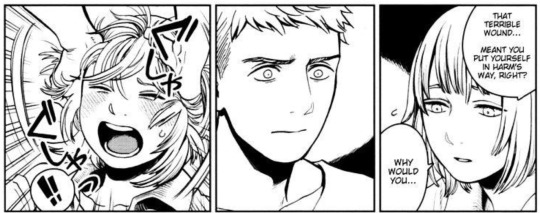
Even more importantly, this final conversation of the chapter reveals one last layer in the knowledge/power imbalance between Falin and the rest of the party: she doesn't actually remember sacrificing herself and teleporting them out.

As I mentioned before, that action was one of the most assertive things we see Falin do in the story, and she doesn't even get to keep that for herself. Instead of being her action, her choice, it becomes yet another thing that the others know more about than her.
I think that's part of why there is such an air of melancholy to this hug they share on the next page
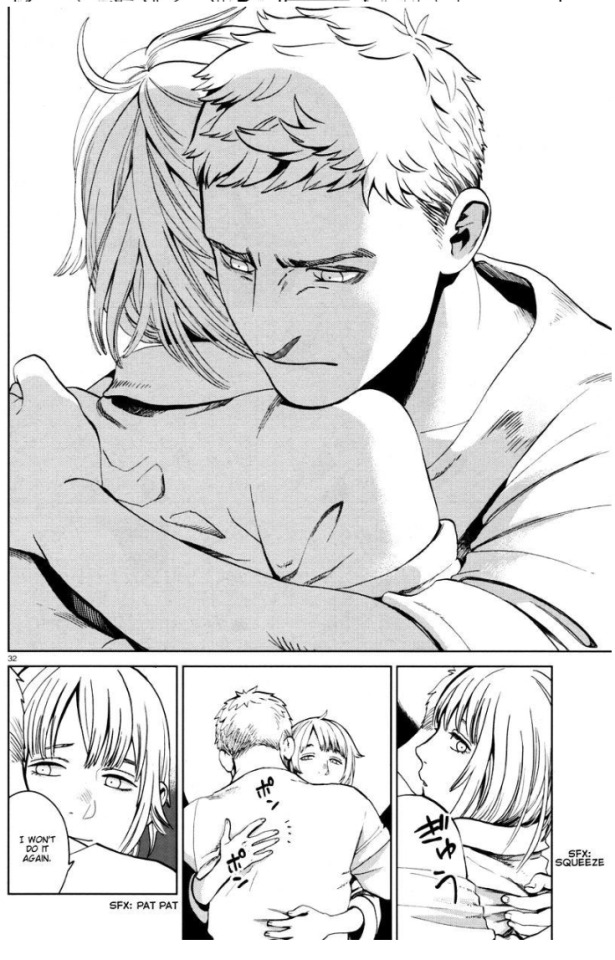
Obviously, obviously, there are so many emotions here for Laios and I don't think its all meant to be viewed as a negative thing, or that he or Marcille are being completely unreasonable. They've been through a lot, and what's more, they think they have time now. So much more time then they actually will have. Time to explain, to open up, to let Falin return to the group in full - as a teammate and not just as someone to be cared for and protected.
But they don't get time. And this relenting by Falin, this "I won't do it again," it's not something that feels triumphant. It's an attempt to comfort them, more a prayer than a promise. As if she is trying to exorcise a spirit. As if she is capable of promising that death won't come, eventually. It's what Laios needs, not what she wants.
That's the real tragedy of the chapter, I think. It's the one time, in the midst of everything, that they have the chance to give Falin what she wants - and they don't do it.
But I do think they realize that, and I think that this failure is a core part of their journey. It's another bittersweet taste to add to the mix - all the missed chances in this chapter to connect, amidst the moments of genuine peace they do get throughout it.
As Laios puts it later...
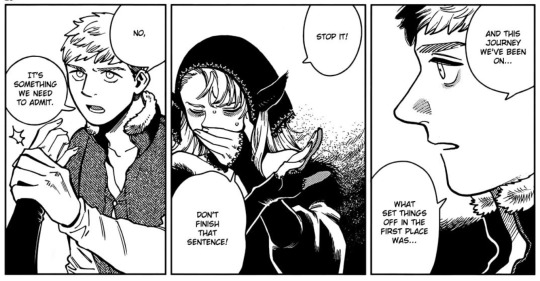
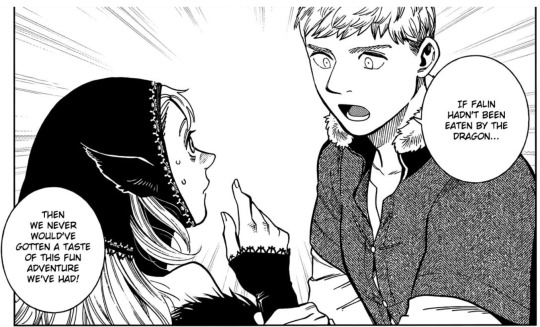
If Falin hadn't been eaten by the dragon, and perhaps if they hadn't failed her here, they never would have had the adventure that they got to share.
(or, perhaps more tactfully: in life & chapter 28, there are both good times and bad. Thanks, Chilchuk)
#dungeon meshi#delicious in dungeon#falin touden#marcille donato#laios touden#dunmeshi analysis#dungeon meshi spoilers
1K notes
·
View notes
Text
I love how a lot of the jokes in dungeon meshi are often disguised foreshadowing. Like the times when Senshi is holding something super hot and Laios comes in contact with it and gets burned. It happens when they’re getting oil from the dungeon trap and Senshi has his finger in it while Laios has a single drop land on him and it ends up making him fall to the ground. It again happens when Senshi’s holding some of the living armor on a steaming hot metal plate then tosses it to Laios who again falls from sitting and throws the food after panicking.
This all sets up for later when they’re fighting the dragon! Laios has a clear pattern of underestimating heat when Senshi is holding hot ass shit so it makes sense to the audience when he over looks the glaring flaw of the dragon’s fire breath heating up the pan as it shields them. Idk if it 100% connects but I really like that build up gags like this end up creating.
#laois dungeon meshi#dungeon meshi spoilers#dungeon meshi#senshi#senshi of izganda#laios thorden#laios touden#dunmeshi#dunmeshi spoilers#dunmeshi analysis
272 notes
·
View notes
Text

God this really hit me hard. I think one of the worst things about being Autistic is that people just fucking despise you and hate you and you don’t fucking know why. Why is talking about my experiences bad? Why is ensuring the safety of my little sibling bad? Why do you hate me all of a sudden? Why? And people wonder why our suicide rates are so high.
230 notes
·
View notes
Text
No one is ready for the Aragorn/Kabru comparison post including me but I’m not gonna put more thought into it so here we go
Both:
Raised by elf
Strong main character energy but not the main character
Hair
Excellent stabbing (Aragorn has the advantage of almost exclusively humanoid baddies but the warg got ‘im good)
Likes to pretend to be brooding and very solemn
Strong moral code
Big king energy, natural leaders of their groups
All ‘bout that noble self sacrifice if necessary
Will also do Whatever It Takes
Dedicated inner monologue to figuring out everyone else’s intentions that defaults to stabbing (I cannot prove this in Aragorn but just look at him in Rohan and talking to kings)
“Effortlessly” resists magic temptation (ring/demon, both had higher priorities)
Have a “friend” they worry will fall to said temptation (Laios/Boromir but listen Kabru & Boromir clasping hands about dying Too Fucking Much)
Do not actually want to be king personally and would really rather not, but are aware there might not be a better option
I Am The Last Of My Line(/Village)
Differences:
Kabru’s better at avoiding being king (buuuuut still ends up in the court so)
Milsiril didn’t have a handy daughter (but listen to my Unhinged Conspiracy Theory About Milsiril Taking Mithrun Home To Train Okay)
#delicious in dungeon#dungeon meshi#dunmeshi analysis#delicious in dungeon spoilers#dungeon meshi spoilers#kabru#aragorn#lotr#this came to me in a vision
60 notes
·
View notes
Text
just finished reading dungeon meshi after starting it like 3 days ago and i am absolutely and all-encompassingly obsessed with it just like the overall theme of food is good and life and its everything and just how we are a part of everything and we are who we are and what we are because of those we love and know and exist around
and i loved all of the character arcs about desire and theres always more things that will make us happy even when we can't see it, and that theres nothing wrong with leaning on other people, and how growth happens and acceptance of what we can and cant do, and about sacrifices freely given for those we care about, and oh my god just everything about it
please come into my messages and talk with me about it cuz omg
#dungeon meshi#dunmeshi analysis#my god just everything about it#makes me want to learn how to cook up anything#i want to be a chef oh my god#i want to be like senshi </3
50 notes
·
View notes
Text
I have many thoughts on the ogres in Dungeon Meshi in the future of the world
They are sapients that are especially disadvantaged under the economic systems we see, because an ogre needs to spend more of their paycheck on food than other sapients
So even if the superstitions and other forces leading to discrimination against them stop, they are still in trouble
Anyway, any implementation of universal basic income should use ogres as the baseline
29 notes
·
View notes
Text
One thing I adore about the dungeon meshi kelpie arc is how it delineates the difference between “trained” and “tame” SO WELL. Anne the kelpie was nice around senshi, because he fed her and was always respectful. She was trained to not attack him, effectively. But she’s still a monster/wild animal, so the moment he showed “weakness” by trying to ride her, her instincts kicked in and she attacked. And. You’d think Laois, the resident animal lover, would be upset about having to kill a seemingly tame monster. But he suggests it first. He’s not just an animal lover, he’s a biology nerd, SO HE KNOWS ITS UNSAFE TO BE SO BUDDY BUDDY WITH A CARNIVOROUS WILD ANIMAL!
2K notes
·
View notes
Text
I want to talk about why I think this is the one of the most important Falin panels:

So, Falin is really nice, right? It's one of the first things we really learn about her. She's kind even to the monsters of the dungeon - choosing to ward the party rather than fight spirits and cause them needless harm.

In the above early flashback in chapter 11, we see Marcille fawning over Falin's kindness, calling her an angel. Namari calls her soft-hearted. We see Falin choose not to fight even when a zombie attacks - instead she resolves the confrontation with a hug. After the flashback, the first thing Senshi says is that Falin "sounds like quite the person," which Marcille strongly affirms.
At this point in the story, all we have seen of Falin are these impressions; she is a healer, an angel, a caretaker with an infinite well of kindness towards everyone she meets - both friend and foe.
And honestly, that remains most of what we have to go by to understand her. The only times we get to see Falin on the page, alive and just herself, are in the opening and closing pages of the story and in the brief period of time after she is resurrected.
Nonetheless, we do have some more details to work with. For one, there is the scene that The Panel is from - a short memory in chapter 75, when Marcille flashes back to while she's dying. In that scene, Falin prepares to teleport them all out, and says that she's sorry "if there is a person at [their] destination." And that's when we get The Panel.
If you teleport someone or something into another person, the person teleported into is likely to be, at minimum, severely injured. They could die.
We can see a lovely little horrifying example of exactly why in one of the Daydream Hour doodles:
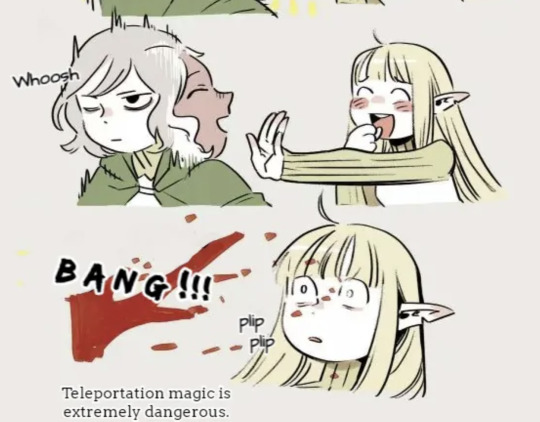
So, hmm. That's not... that's not SUPER nice. Certainly not displaying the same "kindness to all, friend and foe included" we saw represented earlier. On a basic level, this adds some nuance to Falin's kindness. We see it break a little, when pushed to the limit. We see her chose to protect the people she loves above all else.
Which makes sense! As Laios says when the Winged Lion accuses him of similarly being motivated more by his friends' safety than everyone else in the dungeon, "...most people, aside from virtuous do-gooders, would feel the same way."
So, we can take The Panel as simply showing a moment of weakness for Falin. A time when she was pushed to her limits, and that "most people" selfish side of her shone through.
However... I think there's a little more going on with Falin than just her being an angel 99% of the time, except just that once. I love The Panel because I think it helps us understand that Falin isn't just motivated by kindness - she also has a desire to avoid seeing people in pain.
Isn't that the same thing?
No, no it very much is not.
Let's look at a short comic from the Falin section of the Adventurer's Bible, because I think it illustrates this point perfectly. The group is complaining about how much Marcille's healing hurts, and comparing it to Falin's, which "doesn't hurt a bit." Marcille retorts with the following:

Now, the punchline of this comic is that, despite Marcille's sentimental assertion that she's "thinking of [them]" by letting her healing magic hurt, they all still prefer to be healed by Falin.
But hey, this wouldn't be the first time that Dungeon Meshi hides a very real character beat or insight in a gag, so let's think about this somewhat seriously.
If Marcille is right (and she knows a fair bit about magic, so we can assume that she has at least somewhat of a point), then what Falin is doing isn't kind. I suppose if someone specifically requested to not feel the pain, it could be kind, but that's not really what happened here. She is the one who felt badly about the others being in pain, and she is the one who decided, without telling them or giving them a choice in the matter, to take away that pain.
Both Marcille and Falin are healing the party, but Marcille is doing it in a way that accomplishes the task in the most straight forward way, without any additional interference. Falin is going out of her way to perform the healing in a way she is more comfortable with. A way that avoids pain.
Going back the The Panel, I don't think its a coincidence that the only time we see Falin (well, non-chimera Falin) willing to do something that could hurt someone is when any potential pain will be far away from her. If she got someone hurt or killed by teleporting the party to the surface? Not only would it be far out of her sight, but she'd be dead before she had to deal with any consequences of that action.
Falin is not a confrontational person. She doesn't push when Marcille won't tell her the truth about the resurrection, and she comforts Laios about her own death - both of those things happening in the only full chapter she is alive and conscious in the whole story.
We also know that she considered accepting Shuro's proposal, despite not having any special feelings towards him, and that Falin never explained to Marcille that she wanted them to share a meal together. When she brought Marcille various foods at the academy, she just accepted Marcille's confused rejection and gave up.
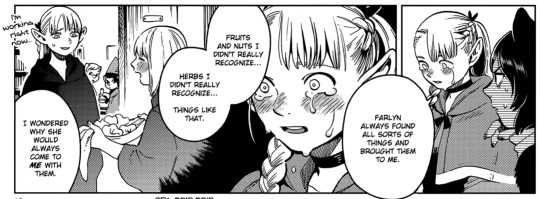
And lastly, we know that she is still in contact with her parents, despite the neglect and abuse she suffered at their hands. Although the way someone chooses to handle contact with abusive or bad family is a complicated topic, which I don't want to overly simplify, I do I think this fact gets at the heart of how she handles conflict.
So many people that Falin loves have hurt her. There are understandable hurts, like Laios leaving the village, or Marcille not understanding the food. And there are bigger, far less justifiable hurts - like her parents neglecting her throughout her childhood, and sending her away to be alone at the magic academy.
It doesn't seem like Falin has ever confronted any of it directly.
And the unhealthy aspects of this kind of avoidance of pain and confrontation is one of the things that the story of Dungeon Meshi is all about. We see Laios grapple with it before he goes to kill Falin, and we see Marcille acknowledge it at the end of the story, when she tells Laios that she has come to terms with Falin's death:
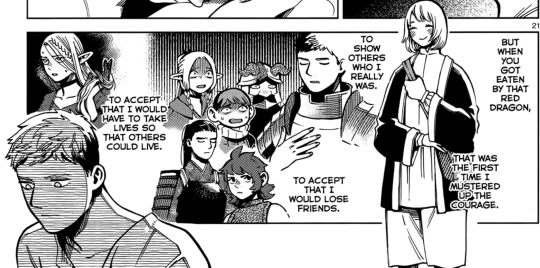

Eating is a part of life. Consuming other living things is a part of life. It isn't really possible to avoid that pain - you can only hide from the truth of it. You have to be selfish everyday. You have to eat - to choose to live. To choose to take up space.
And this is something Falin embraces, too. She comes back to life, after all.
We see her choose to come back to life.
And how does she make that choice? She eats. She consumes, and then she is asked a question by the manifestation of hunger itself:
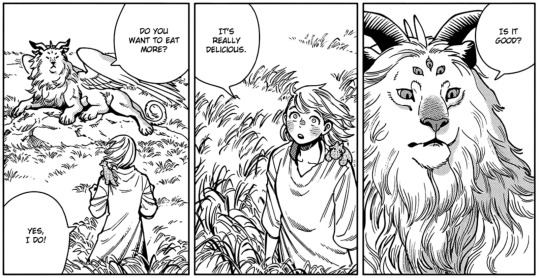
Do you want to eat more?
There is a double meaning in the Winged Lion's final words on the next page.
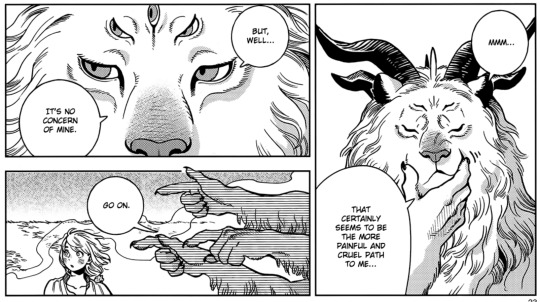
When I first read this, I took it as him saying: life is cruel. You will suffer. You will feel more pain.
But perhaps, especially for Falin, this also means: you are choosing a path where you must cause pain. Where you must consume. Where you must take, and must be selfish. Because eating is the special privilege of the living, and it is their burden, too. In order to stay alive, she will need to keep eating.
And she chooses that. Chooses to be selfish. It's why her resurrection scene is so important, and it's why The Panel is so important. Because Falin coming back isn't the ultimate reward for all of the party's hard work.
It's her choice. Just like it was her choice that started everything in the first place. But this time, she doesn't choose to accept causing pain for the sake of Marcille and Laios. She does it for her own sake.
#dungeon meshi#delicious in dungeon#falin touden#dunmeshi analysis#I love it when dungeon meshi says. the trauma was real and it changed you#and the way you are because of it isn’t anything to be ashamed of#but you have to keep living. you have to chose to keep living.#and you can#dungeon meshi spoilers
14K notes
·
View notes
Text
Evidence that Kabru from Delicious in Dungeon is Indian, a Masterpost
(Some of this info is taken from my upcoming essay about the names and cultural origins of all the characters in Dungeon Meshi. There's a link in the source to the AO3 version of this essay.)
Since Kabru’s first appearance in the anime is upon us, I wanted to write something that compiles all the evidence we have that Kabru is meant to be a person of South or Central Asian ethnicity, or at least whatever the equivalent to that is in the Dungeon Meshi world.
Ryoko Kui can and does draw people of many different ethnicities, and the way she draws Kabru matches the way she draws other Asian characters in Dungeon Meshi. He doesn’t look Black, or Hispanic, or any other ethnicity because he isn’t supposed to. He looks like a dark-skinned South or Central Asian person, because that’s what Ryoko Kui probably intends him to be.
So let’s go through the evidence!
(There are no spoilers for the plot of Dungeon Meshi below, but there ARE spoilers for Kabru's backstory as explained in the manga, and in extra materials like the Daydream Hour and Adventurer's Guide book.)
KABRU’S NAME
The Dungeon Meshi Adventurer's Bible tells us Kabru’s real name is unknown. There are other characters whose real names are only told to us in the Adventurer's Bible and were never revealed in the manga, but then Kabru, Thistle and Izutsumi’s entries simply say their real names are unknown, and though Kui could tell us their true names, she doesn’t. I assume this means that the characters themselves don’t know what their real names are, and that the names they go by are not their birth names, but this is only a supposition on my part.
KABRU THE MOUNTAIN
Kabru (काब्रु) is the name of a mountain on the border of Nepal and India, and part of the Himalayan range. It’s the 65th tallest mountain in the world and it is very snowy and icy, with frequent avalanches. Because of this, even though it’s not the tallest mountain in the world, climbing it is challenging, and is not often attempted. Those few that have managed to climb it consider it a major achievement.
“This prohibitively fearful icefall… had thwarted numerous expeditions, perhaps even the 'thought' of attempting the mountain… Unstable seracs of the icefall, a complex maze of chasms, and delicate snow bridges spanning seemingly never ending, near bottomless crevasses… Each time the members stepped into the icefall, they stood a good chance of never returning.” (Kabru - Mountain of the Gods, Major A. Abbey, Himalayan Journal 52, 1996, editor Harish Kapadia)
WHAT DOES KABRU’S NAME MEAN?
Kabru is a character that is known for being very good at charming people, but who doesn’t express himself honestly, because he’s trying to manipulate the people and situations around him in order to maintain control at all times. I think nobody really knows who Kabru is deep inside, maybe not even Kabru himself, so a remote, hostile, icy mountain that’s hard to climb seems like an extremely appropriate name.
Some of the oldest English sources I found regarding Kabru suggest that Kabru isn’t the correct local name for the mountain (a common problem in early Himalayan exploration by Europeans) and might just be a descriptor, or that it’s a misspelling.
This makes the name seem even more appropriate, since Kui’s told us Kabru’s true name is unknown. It’s possible that Kabru was a place-name or a descriptor that Milsiril (Kabru’s elven foster mother) was given when she picked up a traumatized 7 year old Kabru, and she just started using it as his name, and that even he doesn’t remember his real name thanks to his severe trauma.
The fact that people in the real world can’t seem to agree on the mountain Kabru’s name, or what it means, reminds me of the running gag of Laios repeatedly getting Kabru’s name wrong in the manga.
"All the people near the Kabru massif call it 'Kaboor'." (The Alpine Journal, 1921-22 Volume 34, Edited by George Yeld and J. P. Farrar)
“It is also said that the name applies to a peak close to Kinchinjunga on the southeast, and not to the peak known to Europeans as Kabru… [The real name is] Pahung Ri [Pauhunri].” (Appendix I: Place Names in Darjeeling. The appendix says it was “compiled mainly from an article written by Colonel Waddell and published in the Journal of the Asiatic Society of Bengal (Vol. LX, part I, 1891)”)
“Kangchen is a Tibetan name… the Sikkhimese use it as the name for the peak called Kabru by Europeans.” (Charles Bell, Dyhrenfurth's Himalaya (Berlin, 1931))
“...Kyabru or the horn of protection. The name is… Kabur… possibly a corruption of Kangbur or the swelling of snow; it might also mean the white swelling (kar-bur).” (Appendix I: Place Names in Darjeeling.)
“Kabru literally means the 'White Avalanche' peak (Ka means 'white' and bru means 'avalanche').” (Kabru - Mountain of the Gods, Major A. Abbey, Himalayan Journal 52, 1996, editor Harish Kapadia)
I’ve seen one other mountaineering article cite the “white avalanche” meaning, and I think it’s plausible since the Appendix says it can mean “white swelling” or “swelling of snow”, which may very well be a literal translation for “white avalanche”.
WHAT ABOUT UTAYA? IS THAT INDIAN TOO?
Utaya means “raised” or “uplifted” in Hindi, but it’s also a real village and a Japanese boy’s name.
Utaya (ウタヤ) is the name of the village that Kabru was raised in before his mother died and he was adopted by the elf Milsiril. Utaya is located in the southeast of the Western Continent. It’s worth noting that Kabru probably wasn’t born in Utaya, since his mother had to flee from her home to keep Kabru alive, so Utaya may be some distance away from his birth place… Not so far that a woman with a newborn baby couldn’t survive the trip, but far enough that her husband’s family gave up on chasing her. So Kabru was probably born in a close-by area.
In the real world, Utaya (Yakut: Утайа) is in an extremely rural and isolated area with a population of less than a hundred people. It’s located in the Sakha Republic, which is in the Northeastern part of Asia in the Russian Federation. The Yakut/Sakha are a Siberian Turkic people.
The Turkic peoples are a collection of diverse ethnic groups of West, Central, East, and North Asia as well as parts of Europe, who speak Turkic languages.
Early and medieval Turkic groups exhibited a wide range of both East Asian and West-Eurasian physical appearances and genetic origins, in part through long-term contact with neighboring peoples such as Iranian, Mongolic, Tocharian, Uralic/Yeniseian peoples, and others. Turkic peoples share, to varying degrees, non-linguistic characteristics like cultural traits, ancestry from a common gene pool, and historical experiences.
JAPANESE MEANINGS FOR UTAYA
Utaya can be a Japanese boy’s name with several different meanings, depending on which kanji it’s spelled with.
In most of the spellings: Poetry, sing a poem, singing, compose poetry
In many of the spellings: The place where the sun shines, it's been a long time, distant, big, to shoot with a bow, to swear, affirmation, question.
The Utaya disaster happened a long time ago.
If Utaya is up in the mountains above the clouds it’s a place where the sun shines brightly.
Kabru has sworn to himself that he will prevent another Utaya tragedy from happening.
In only a few of the spellings: to mend, feathers, wings, a word for counting birds and rabbits, sort them out, washing with water to separate the good from the bad, roof, house with a roof, a world covered with a big sky, infinite space, song that praises the Buddha, Eight.
Counting birds and rabbits makes me think of divination and also that the people of Utaya were like little birds and rabbits (small prey animals) to the monsters that devoured them.
Separating the good and the bad could hint to the “judgment” of Utaya and the greed of its people that led to their downfall, also sorting through things to separate good and bad is something that’s done with food and other resources.
The Himalayan region is often referred to as the “roof of the world”, with a big open sky above it.
The infinite could refer to the dimension the demon comes from, or to the sky above the mountains.
Buddhism is a common religion in the Himalayan region, and eight has auspicious connotations in Buddhism.
With all that in mind, Utaya as a name for Kabru’s home village is an interesting choice, and adds another layer to his origins, maybe suggesting not just North Indian/Himalayan, but Central or North Asian cultural influence as well.
It is also possible that the name is just telling us that Utaya is “up” in the mountains, or that it was “uplifted” by the wealth of the dungeon, or even that Kabru was “raised” there… The Japanese name meanings are also extremely fascinating and hint at similar ideas, as well as the tragedy that happened to Utaya.
WHY ELSE DO YOU THINK KABRU AND UTAYA ARE HIMALAYAN?
In the real world, the Himalayan mountain range is an extremely popular tourist destination, and the amount of people who want to visit and attempt to climb the mountains far outpaces the local ability to support it. This makes me think of the dungeon of Utaya and how people overcrowded it in their desire to conquer and exploit it.
Dungeons as an unsustainable way for locals to make a living that leads to the destruction of their homes when the dungeon inevitably collapses is a major plot point in Dungeon Meshi, so I think the parallel is likely intentional. Characters often talk about someone “conquering” the dungeon, and “conquer” is also the terminology commonly used for climbing a mountain. This terminology obviously has a hostile, imperialist subtext in the real world, since it’s most commonly used by outsiders talking about proving their strength by climbing a mountain.
Also, there are local legends in the areas surrounding Mt. Kabru that there is a valley of immortality hidden on its slopes, which reminds me of the way that the dungeons can grant conditional immortality to the people inside of them.
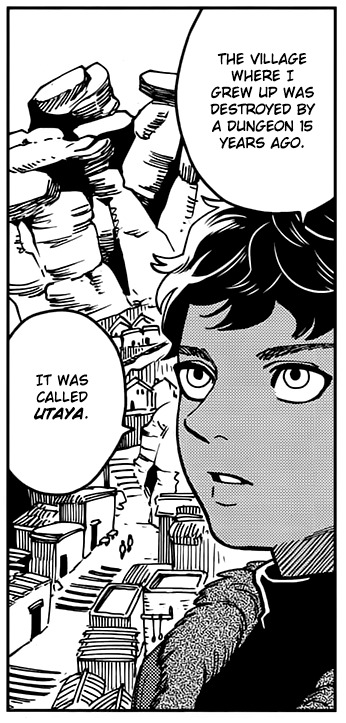
This image of Utaya could be showing us a village built on a mountainside. The house shapes seem a bit more Middle Eastern than Nepali/Indian, but it’s not a detailed drawing and the roof styles are a mix of flat and peaked.
CULTURE
In the Daydream Hour sketchbook, Ryoko Kui included a small comic about characters sharing desserts from their home countries. A young Kabru is shown enthusiastically trying to share an unnamed sweet, and he is interrupted by his elven foster mother, who insists he present a type of elven cake instead. We know that Kabru hates this type of cake, and he seems disappointed to have to eat it and talk about it.
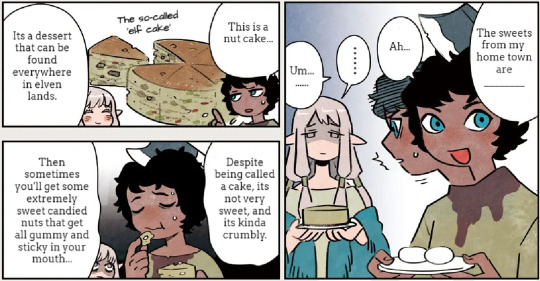
The white balls in Kabru’s dessert are very likely meant to be an Indian sweet called rasgulla (literally "syrup filled ball"). Rasgulla are a dessert popular in the eastern part of South Asia, made from ball-shaped dumplings of chhena dough, cooked in light sugar syrup. While it is near-universally agreed upon that the dessert originated in the eastern Indian subcontinent, the exact origin is disputed. Rasgulla are as culturally important to the Bengal and Odisha regions of India as Parmesan cheese is to the region of Parma in Italy.
Rasgulla are also popular in Nepal, where they are called rasbari.
KABRU’S PHYSICAL APPEARANCE

Kabru is one of several characters in Dungeon Meshi with clearly non-European features: he has brown skin and thick black/dark brown curly hair. He has almond-shaped eyes with long, dark lashes (fans like to joke that he’s wearing eyeliner). All of these are traits common to people from the Indian subcontinent. His blue eyes are not common for someone with his skin/hair color, but blue or green eyes are not unheard of in that region either.
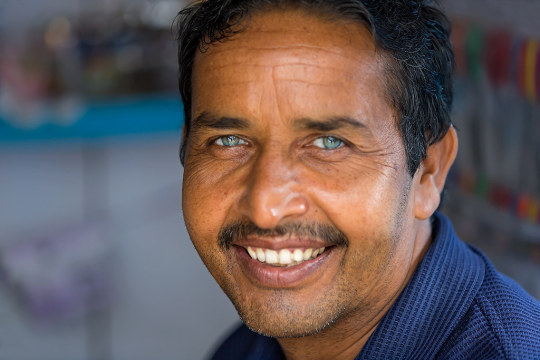
(Indian man with blue eyes)
Blue or light eyes are often a cause for discrimination, like what Kabru experienced as a child. More on this in a moment.
Kabru is 5’7” (170cm) tall, which is short for a Northern European man (180), tall for a Nepali man (162cm), but close to the average height of Indian men (177cm). He has a slender build, which is also common for Asian people in general, and South Asian men in particular.

Compared to the European-looking tall-men in Dungeon Meshi (such as Laios, Falin, Delgal, Marcille’s father), Kabru’s facial features look more like the other Asian characters, such as Toshiro and his party.
CAN DARK-SKINNED PEOPLE HAVE BLUE EYES?
Yes. Light-colored eyes are very uncommon in parts of the world where most people have dark eyes, since dark eyes are a dominant trait in real-world human beings. That means that in order for two parents with dark eyes to have a child with light eyes, both parents need to have a recessive light-eyes gene (or for there to be an illness or genetic mutation), and that’s rare in populations that don’t have a lot of light-eyed people to begin with.
THEN WHY DO SO MANY DARK-SKINNED CHARACTERS HAVE BLUE EYES?
Anime and manga often give characters with dark skin light colored eyes instead of allowing them to have brown or black eyes, which is much more common in real life. It’s a hurtful design trope that makes many readers feel that their natural dark eyes are somehow ugly or inferior to blue eyes.
This trope is used over and over again by authors who want their characters to look “cool” and “exotic”, and for their eyes to be high-contrast to make it easier to show their emotions.
I don’t think this is what Ryoko Kui is doing in Dungeon Meshi.
UNREALISTIC HAIR AND EYE COLOR COMBOS IN ANIME
In a lot of anime/manga, blue eyes (regardless of skin color) don’t actually mean anything in the narrative, in the same way characters having green or pink hair doesn’t mean anything, the colors are non-diegetic, they don’t actually exist in the world, like the music that plays in the background without an on-screen source.
It’s an artistic shorthand to make characters visually stand out, instead of giving them all black hair and eyes like most real-life Japanese people… Which is what most anime/manga characters are meant to be: Japanese people.
Dungeon Meshi has a large cast of characters that are explicitly meant to be non-Japanese. We know this because there’s a group of characters that are Japanese, and they’re drawn differently from everyone else, they wear ethnically Japanese clothing, and have ethnically Japanese names.
Unlike other series, where eye and hair color don’t mean anything, Dungeon Meshi has no unrealistic skin, hair, or eye color combinations.
(Except for the elves, who seem to have different genetics than real world-humans. I’ll get into that another time.)
Ryoko Kui must be aware of the dark skin, blue-eyes design trope, because if she gave Kabru blue eyes just because she thought it looked good, surely she would have made some of the other Asian or dark-skinned characters have light eyes. Out of 9 Asian or dark-skinned tall-man characters, Kabru is the only one with blue eyes.
Kabru having light-colored eyes is central to his story, and Kui talks about it.
KABRU’S STORY AND WHY HIS BLUE EYES MATTER
Kabru’s father and his family tried to kill Kabru when he was born because he had blue eyes. Kabru’s mother ran away, and ended up raising Kabru by herself in Utaya. She didn’t try to return home to her own birth family, but instead struggled to raise a child completely on her own with no money or support, which implies she had no other options, due to the fear people of their region have for people with blue eyes.
This is a real thing that used to happen frequently in areas where most of the population has dark eyes, and it still happens to this day.
In a realistic story, this is logically what would happen to a character with dark skin born with blue eyes in a place like the Utaya region. It’s rare for manga or anime to show dark-skinned blue-eyed characters facing this.
WHAT IS THE “EVIL EYE”?
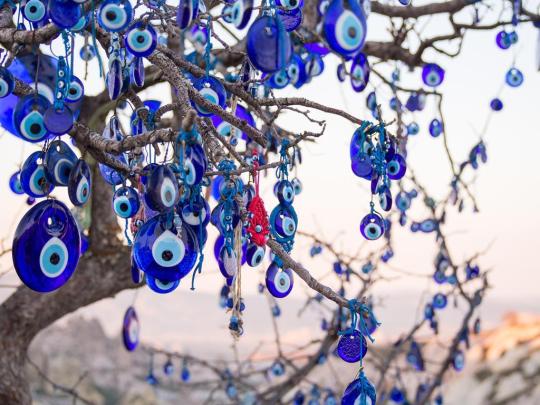
The “evil eye” is a supernatural belief in a curse brought about by a person looking at you. The belief in the evil eye has existed since prehistory, as long as 5,000 years ago. It is estimated that around 40% of the modern world's population believes in the evil eye. This concept is most common across the Mediterranean, the Balkans, the Middle East, and Central and South Asia, areas where light-colored eyes are uncommon.
In areas where light-colored eyes are rare, people with green eyes, and especially blue eyes, are thought to bestow the curse, intentionally or unintentionally. Just one look from a blue-eyed person is often considered enough to inflict a curse.
One of the most famous and widespread talismans against the evil eye is the nazar, a glass amulet featuring concentric circles in dark blue, white, light blue and black. It’s supposed to “bounce” the curse away from the wearer.
HOW DOES THIS APPLY TO KABRU?
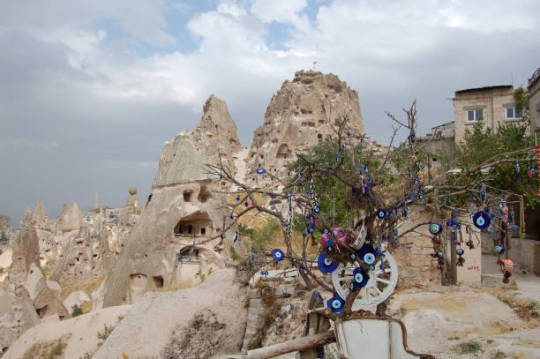
Imagine Kabru growing up in a village surrounded by people wearing and hanging talismans that look like his eyes, because the people around him think blue eyes are evil. They call his mother a witch for birthing him, and a whore because she doesn’t have a husband. Imagine parents forbidding their children from playing with or even talking to Kabru. People crossing the street to get away from him, or chasing him away by throwing rocks.
I think the reason young Kabru was able to learn how to speak some kobold is likely because he was so heavily ostracized by the other tall-men around him, the only children he could occasionally interact with in Utaya were kobolds, who might not share the same cultural superstitions that the tall-man do.
This childhood trauma, combined with Kabru’s experience of the dungeon collapse in Utaya, and being raised by an elf that treated him more like a pet than a human being, set Kabru up as a character who has never had a home where he belongs. He has been an outsider from the instant he was born, and every place he has lived treats him as an “other.”
To his father’s family, he was a curse. To his mother, although she loved him, he was a burden. To the people of Utaya, he was a monster. To the elves, he’s a tall-man baby (no matter how old he gets) with funny looking eyes, to the people on Merini Island, he’s a foreigner from the West with elven ways and education.
CONCLUSION
I wanted to write this because I know some people will see Kabru in the anime for the first time today and think "Oh, another dark skinned blue eyed character! This is a bad character design that is evidence that the author is racist at worst or ignorant at best.” And I don’t think that’s a fair assessment of Ryoko Kui’s work in Dungeon Meshi.
This isn’t to say that Ryoko Kui has never done anything wrong, or that her work couldn’t be more inclusive, or that there’s no way in which she could improve.
But there are pages and pages of artwork she’s done that shows she cares about these issues, and I think it’s worth celebrating when someone makes that kind of effort with their artwork.
ANYWAY…
If you’ve read this far, you’re very strong hahaha. I hope you enjoyed this essay. I’ll be publishing more soon when I finish my Dungeon Meshi research on the names and cultures of all the characters. Wish me luck!
1K notes
·
View notes
Text
the greatest narrative on autism in dungeon meshi is the way the story handles laios' relationships with other people
he's kinda insensitive and gets easily hyperfocused on what interest him, to the point even namari who never thought of him as a bad person didn't have the most stellar impression of him
but as the story progresses, as laios is put in situations that needs him to thoroughly communicate with others, even the reveal of shuro's distaste of him becomes an important part of his character growth
but this isn't a one way street where laios learns to be "palatable" to neurotypicals
this is a story of how people accepts that laios is different, and adjusts their interactions with him to suits his needs, the same way laios who left his village because he was disgusted by how they treated his sister, who ran away from the military due to his refusal to conform to the norm, became a king of a nation where multiple races live not in a total harmony, but in mutual understanding
2K notes
·
View notes
Text
Okay I'm doing it. I'm chapter 96 posting.
This is not meant to be a big analysis post this is mostly just me sharing all the little moments that Marcille & Laios show their care for each other because they are SO beloved to me. Join me on the journey if you wish.
(but also the above statement may be a lie. I do have a point here, it turns out, and the point gets at some of my Big Feelings of what Dungeon Meshi has to say about the nature of friendship & living in the world)
So, first of all, the conversation about Laios being king at the start of the chapter. Just in general Laios insisting on presenting himself in his own way here is so good. Character development!!
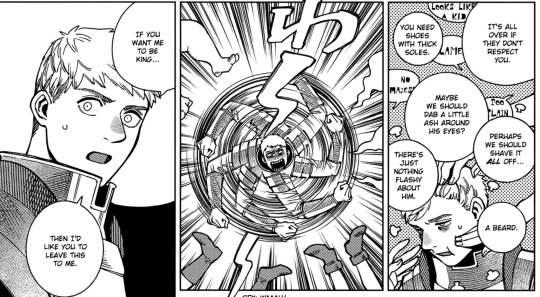
Before the events of the story he hadn't shared his inner world with anyone but Falin. Now he's like Actually I'm gonna dress up in the discarded remains of my monstersona and that's just how it is.
And even though there are a LOT of parts of the story and bits of character growth that go into this, I think it specifically highlights some interactions from a few chapters ago.
After all, his initial reaction to having been in that monster form & coming out of it was trying to hide from everyone.
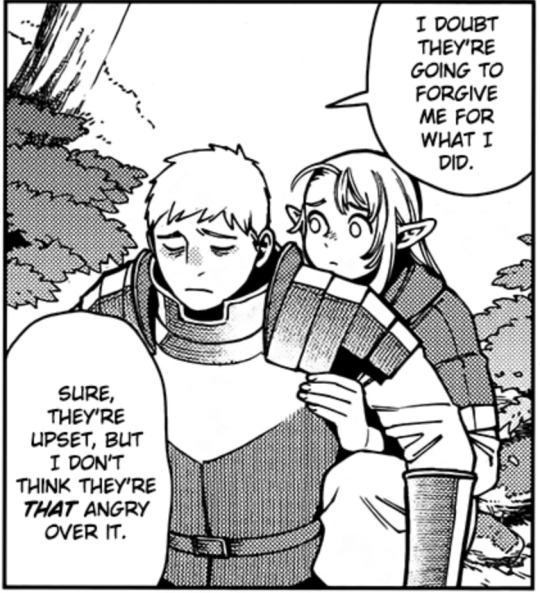
And I think everyone helping him put things in perspective here contributes to how he is able to present himself as king. They assure him that he is accepted, despite having just been seen by EVERYONE at his Peak "Weird Monster Guy" mode.
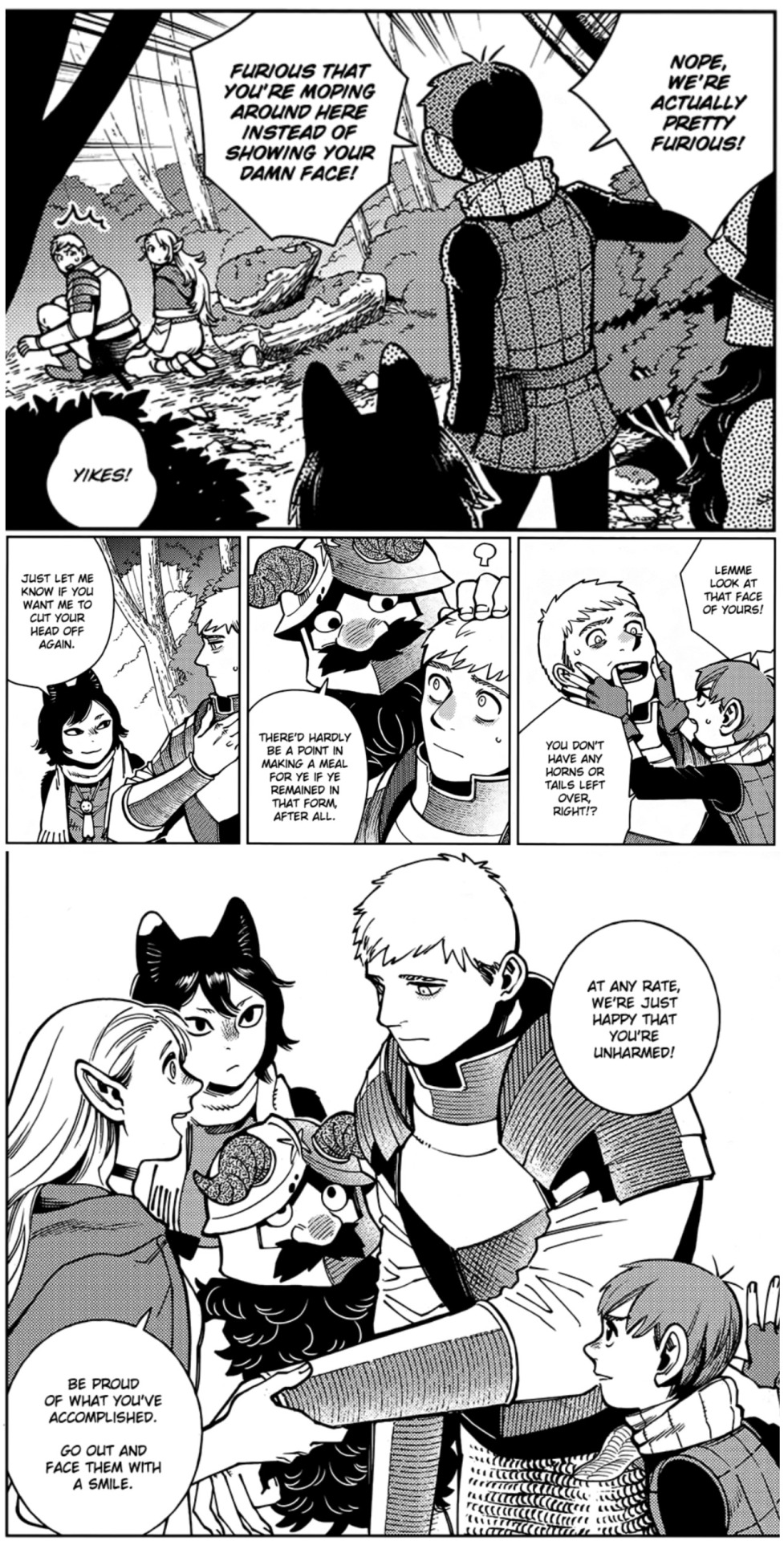
Highlighting what Marcille says here especially:
Going out to "face them with a smile" is EXACTLY what he does. Not right away. He's still pretty stressed in the following scene in this chapter. But he is able to face the crowds with a smile, eventually...
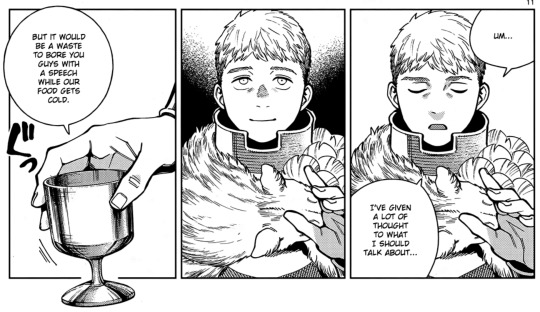
As king. Dressed in the memory of his most vulnerable moments, the most honest expression of his desire.
BUT I'M GETTING A LITTLE AHEAD OF MYSELF. Before the King Laios speech, there's a little moment with Marcille I want to highlight, because...
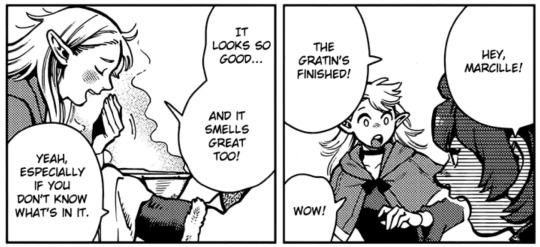
Did y'all know that by the end of the manga, Marcille isn't like... grossed out by eating monsters any more? Or at least, she's definitely changed her reaction to it. It's Namari who makes the "yeah it smells good despite what it is" comment, not Marcille.
We even get shots later of Tansu, Shuro, and Kabru being kinda grossed out by - but still going ahead and eating - the different Falin foods. Chilchuck also throws out a line about it being surprised that it's good.
But there's no disparaging comment from Marcille, despite the Everything of the situation. I just think that's also a nice little detail. She may not be as far in the monster eating game as Laios, but she's more willing to roll with the weirdness.
So after this little moment, this is when Laios comes out in his new regal outfit. And first of all...
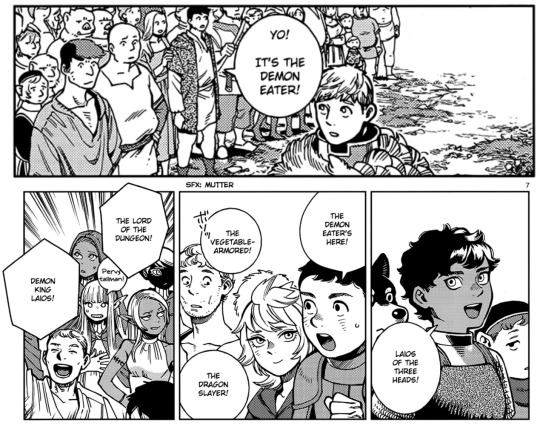
This is such a good contrast to the moment when the group goes to save Marcille in chapter 84. The monsters had stopped attacking, and everyone's reactions to Laios and the others framed him as unsettling. Creepy. Maybe even traitors.
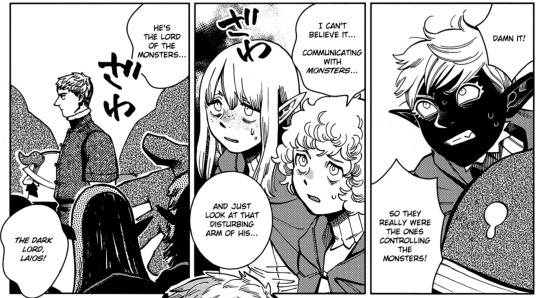
They even use some of the same labels (lord of the monsters/lord of the dungeon, dark lord/demon king)., but the context is that they are disgusted. The parallels in this manga....

Have a tendency to destroy me. What a difference in reception.
Anyway, after this moment, Laios stops to talk to the group... and I'd like to point out again: MARCILLE ISN'T FLIPPANT HERE EITHER!!
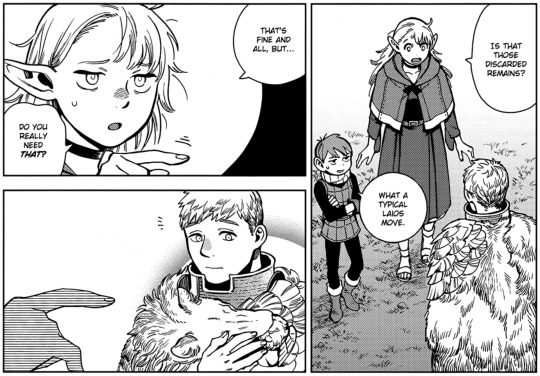
Chilchuck is still Chilchuck, of course, and I want to be clear I love that, too. Chilchuck is who he is to his core. His little jabs are very affectionate in this chapter.
But Marcille... Marcille only points to the Winged Lion symbol as being weird, not the monster bits. And like, considering what she's just been through with the lion, being skeptical of that part is... fair.
(don't get me wrong, her "that's fine and all" isn't exactly excitement. BUT the point I'm trying to make is less about her completely changing her feelings & preferences. It's more about how she expresses them, and how she treats Laios and HIS feelings & preferences)
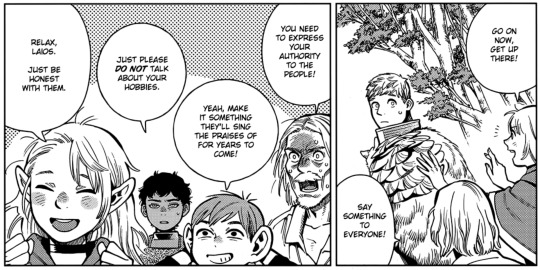
And she continues to be so encouraging!! Wah!! Like, despite, all four of these people definitely caring about Laios, it's Marcille specifically who tells him to relax and just be honest. And you know what? I think that's what Falin would have said, too.
Please also note how cute everyone's little faces are in the crowd:
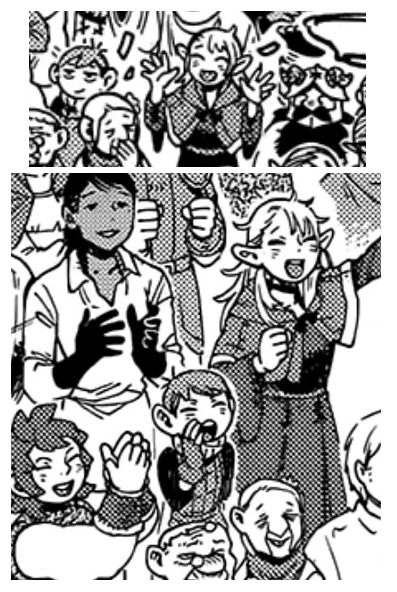
(see, Chilchuck loves him too!! Look at that fond face, and the cheer. and Senshi! and Namari! They really are such a family)
Laios' short speech actually has a little bit I'd like to highlight as well, since I think it is a nice little reflection of his choice to keep the lion insignia on his new outfit:
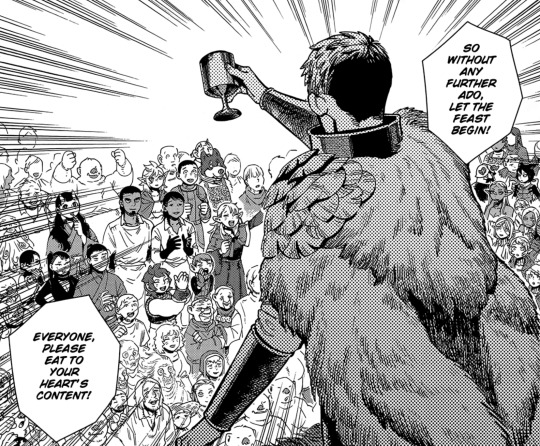
"Eat to your heart's content," he says. Not just "enjoy," or "let's eat."
Dunmeshi does such a wonderful job of framing so much about the Winged Lion with nuance, and this is a good example of that. Desire is not bad! Craving and consuming is beautiful. As Laios says when explaining the lion insignia...
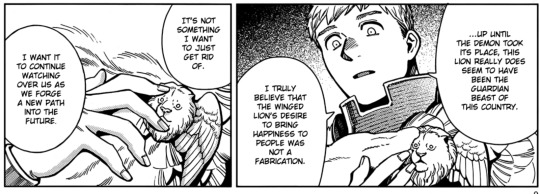
It's not just something to get rid of.
So then... on to the feast!
And not only does Marcille not express any grossed out feelings, as I mentioned before... she even helps to gross out Chilchuck!!
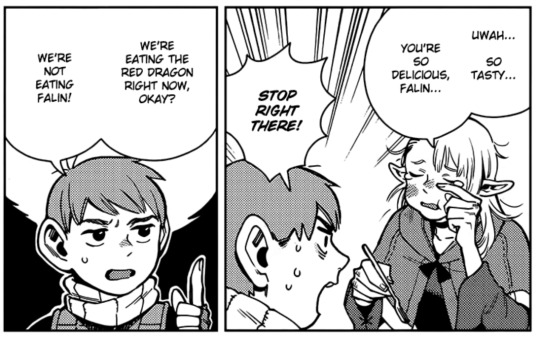
Her weird girl powers are only just in their infancy. She will only grow more powerful in time...
As the feast goes on of course we get the group's realization about her hair, and I'd like to point out:
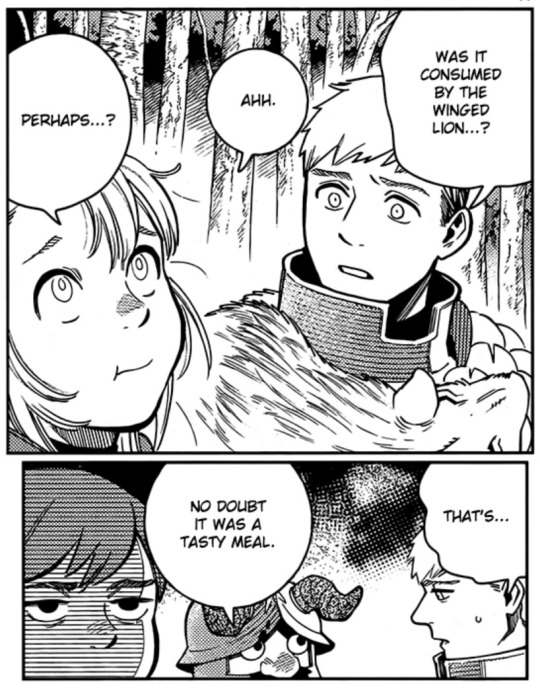
I really feel like they have such similar reactions to finding out about how the other has been affected by the Winged Lion
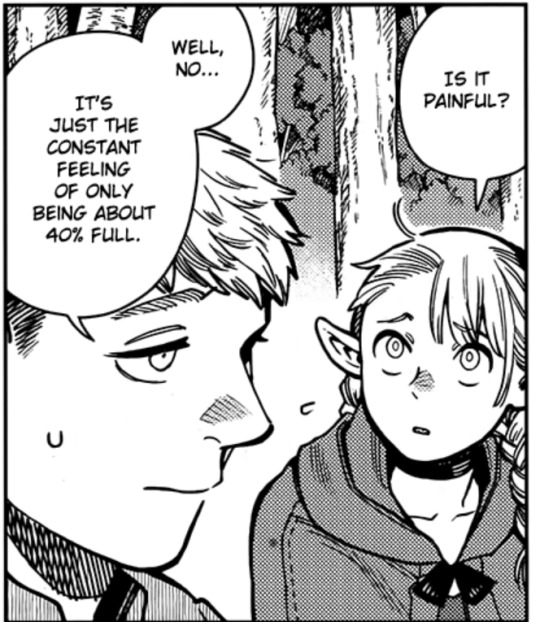
Just... the quiet concern. Not making a huge fuss, but... worried. Understanding. A little heartbroken for each other.
SPEAKING OF HEARTBROKEN REACTIONS THOUGH. WHAT COMES NEXT REALLY GETS ME.
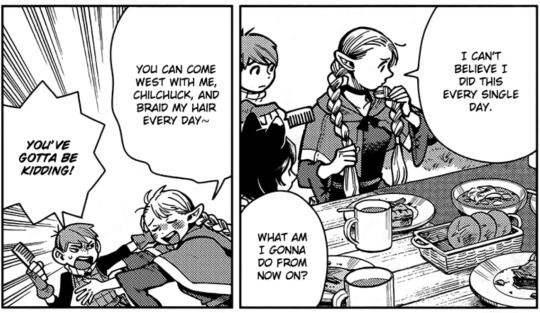
After Chilchuck braids Marcille's hair for her, the topic of her needing to leave everyone comes up and...
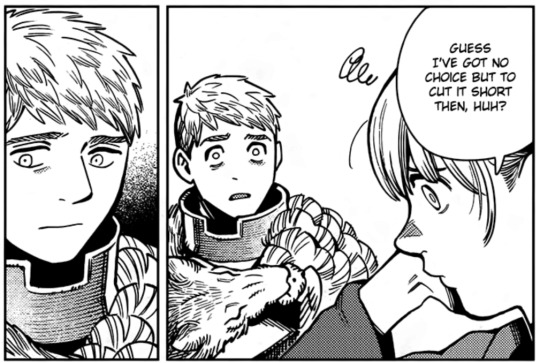
God, these expressions. Every Time I see these panels I think about about what Laios saw in her nightmare. Her fears. The weight of inevitable loneliness, and the way it has marked her. As much as Marcille tries to keep things light when talking about it, he knows what this means to her. And it HURTS.
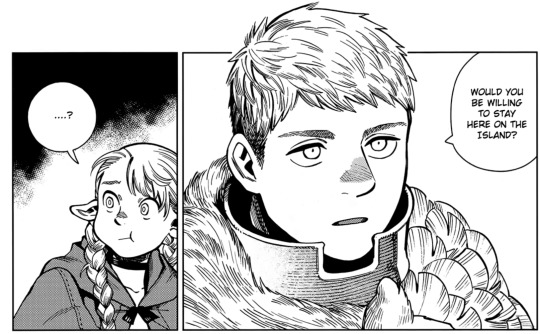
So he doesn't accept it. But do you notice how he frames this. Do you see. Not "do you want me to fix this." Not "hey I have an idea."
"Would you be willing to stay."
He doesn't know whether she will accept. Whether she will hate the idea, actually, of staying here with him. He's putting himself out there fully prepared for rejection & dismissal, as he has faced many times before.
But his pitch, his proposal to her, it's not JUST an excuse to ask her to stay, either. He's put thought into this. Into what Marcille could mean and do here. Not just to and for him, but for the people of this area. The place he has taken responsibility for.
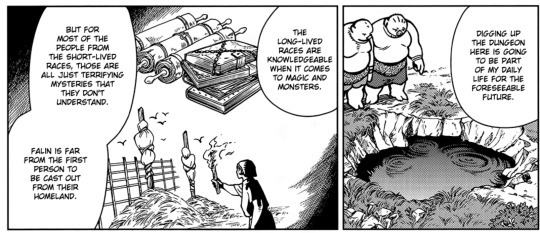
He's also thinking about Falin. And about all the other little girls, the people of all sorts, just like her. He's thinking about the people who have been killed (burned at the stake???), hurt, shunned. About the people who have been abandoned. The people who are still alone.
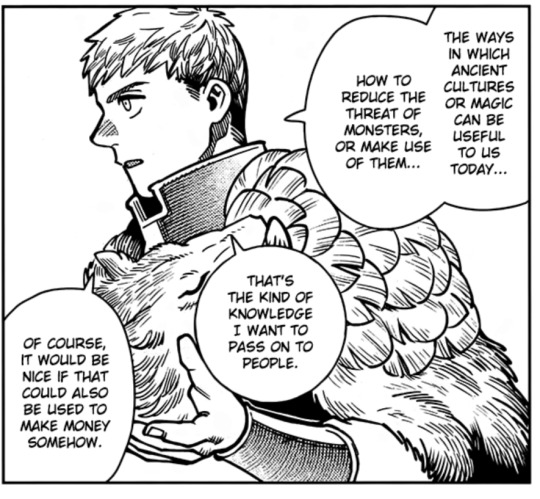
He's not just offering Marcille an out from her isolation, he's offering her a new purpose. A new way to continue her work, to do the things she cares about. He SEES her! he understands her.
BUT ALSO HE'S SO NERVOUS OUGH. FIDDLING WITH THE PLATE. UNSURE IF SHE WILL CARE. UNSURE IF HE HAS IT RIGHT.
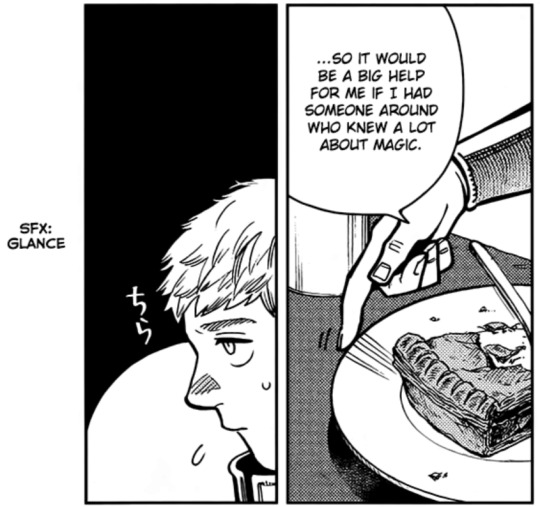
HE'S NOT GOOD WITH PEOPLE HE'S NOT GOOD AT THIS.
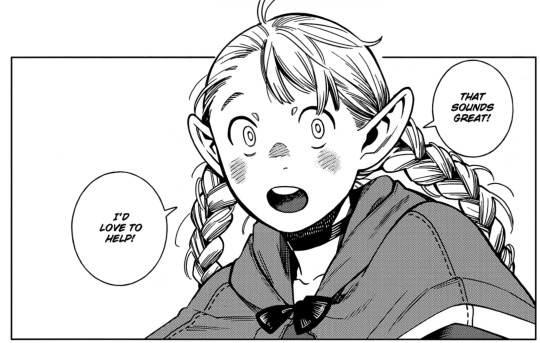
BUT THEY UNDERSTAND EACH OTHER. AND SHE WANTS THIS LIFE HE'S OFFERING HER.
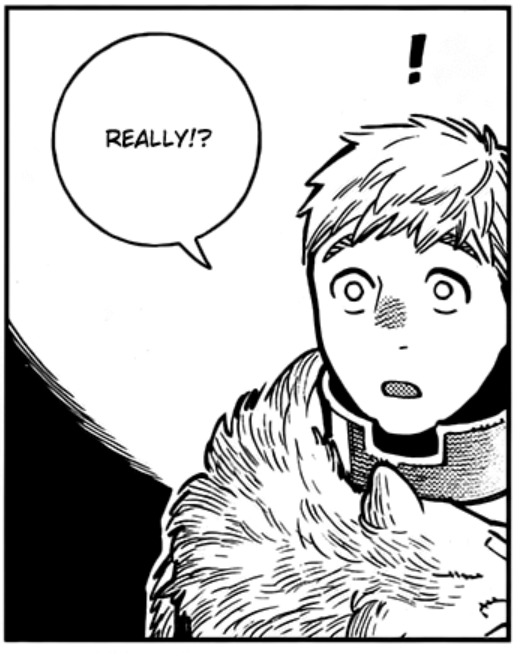
Still... it's not that simple for her, even if for a moment she is swept up in how much she wants this.
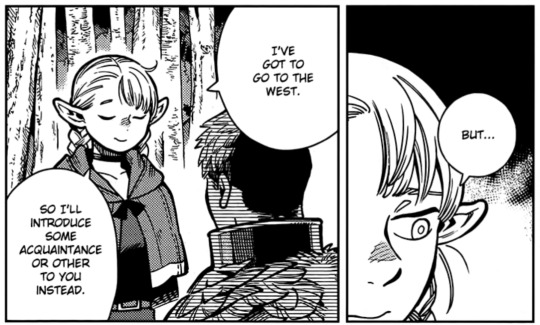
Again here, Marcille is working so hard to be chill about the whole 'going west with the elves' thing. She looks absolutely devastated in the first panel, but puts on a smile in the second.
Maybe she doesn't want to bring down the mood. Maybe she doesn't want to burden everyone with what seems like the only option she has. Maybe she had already accepted the cost that might come with bringing Falin back. Maybe after everything with the Winged Lion, she doesn't want to risk letting herself fight for her desires too hard.
But hey. Desires aren't always bad. They aren't something to just get rid of.
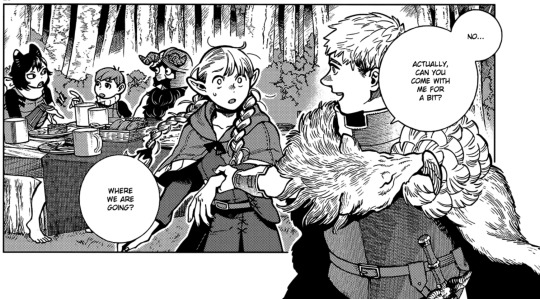
A small bit of visual storytelling here... I love that Marcille is confined by the panel, but Laios is stepping outside of it. He's literally pulling her outside of the box she feels trapped in.
Also, I love that his first acts as king are:
1) welcome everyone to a big feast
2) stand by his friend and help her find happiness
It's great stuff and it's so Laios.
In addition to that, I love how this whole act actually plays out. I love that, while getting the elves to let Marcille go, he gets to be extremely cool and protective...
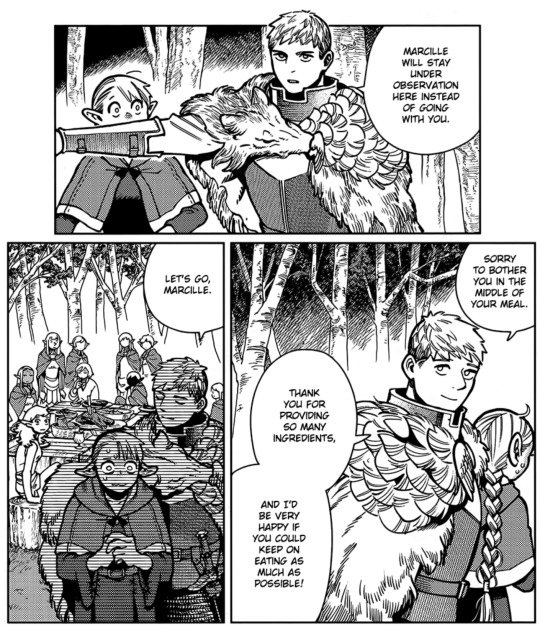
but also like. Not THAT cool and protective.
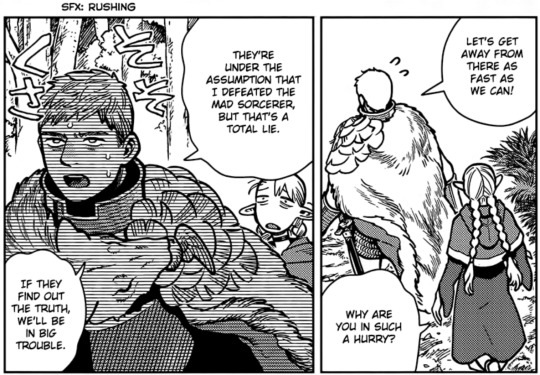
No really, I mean it! I think it's important! It's important that cool 'suave king guy Laios' is a front he puts up when he needs to deal with these strangers, and one that he completely drops once it's just him and Marcille.
He's not trying to impress her, or convince her he's cool and suave. Why would he? He trusts that she's okay with the messy, often unimpressive, sometimes kinda gross reality of who he is.
And isn't that what Dungeon Meshi is all about? Messy, unimpressive, gross reality. And how beautiful, how wonderful, how very precious it is
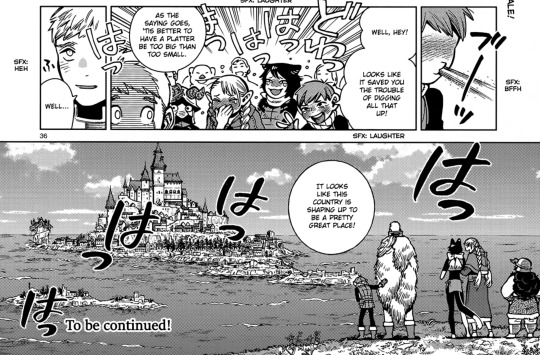
Especially when you get to share it with your friends.
#dungeon meshi#delicious in dungeon#laios touden#marcille donato#dunmeshi analysis#dungeon meshi spoilers#posting on this blog bc I'm not sure the sideblog is showing up in tags yet :/
618 notes
·
View notes
Text
you ever think about the fact that laios won not by being a monster but by being human.
monsters as we’ve seen throughout the manga are predictable, they have this rhythm to them that, once someone understands, can be used to take them out. take kelpies like anne where laios states that she is just a monster and cannot be trusted. even kensuke is “just a monster after all”, running away from danger when laios needs it most. kensuke is beloved by laios not just because he is a monster, but because laios, in human fashion, anthropomorphized him in his mind (giving him a name, etc.)
but people are different. they are multifaceted, non-monolithic creatures. long lived races are not all pious and apathetic towards short lived races as we see with marcille and senshi. chilchuck actively works against the prejudice against half-foots. tallmen from every region have their cultural differences as we see with shuro and laios/falin. even “demi-humans” like orcs have depth to them, having rich culture and values despite the general idea that they are a violent pillaging race.
even laios’ family and village, the nexus point for his dislike of people, have depth to them. though their parents did not actively protect their children, they did not wish harm on them either. the exorcisms performed on falin by their mother was harmful in laios’ eyes, but helpful in his mother’s perspective.
laios himself, despite loving monsters and hating humans, is so very painfully human. he hates humans but has risked life and literal limb to save his sister and his party. he loves monsters but is aware of their dangerous nature and spares them no mercy.
(big spoilers under the cut)
the winged lion mistook laios as a one dimensional entity, one which only operates on a one track mind without paradox. it thought laios to operate like a monster, and so it approached his desires like one. it believed that laios, being so obsessed with monsters, must behave like one as well, so completely disregarded the fact that laios could have something up his sleeve.
but laios is not a monster, he is human. he has ulterior motives, overlapping beliefs, contradicting values. it is his humanness that made him explain to his party what to do when things went awry. it is his humanness that allowed him to lie. lie to the world about his true plan as well as lie to the winged lion about his intentions.
sure laios WANTS to be a monster, that much is definitely true. but what he IS is a different story. laios is an unpredictable, sporadic, messy human being. it is that fact which the winged lion overlooked, and ultimately led to its downfall and laios’ victory.
#ohh the multifaceted nature of human beings and the beauty of the human condition#ryoko kui really outdid herself#dungeon meshi you will always be important to me#anyways don’t mind me i’m just having Laios thoughts#ignore the fact that i accidentally said two dimensional entity the first time i know language i swear#laios touden#laius thorden#???#dungeon meshi#delicious in dungeon#dunmeshi#dunmesh spoilers#the winged lion#rambles#ryoko kui#anime#manga#analysis
352 notes
·
View notes